Презентация international-law

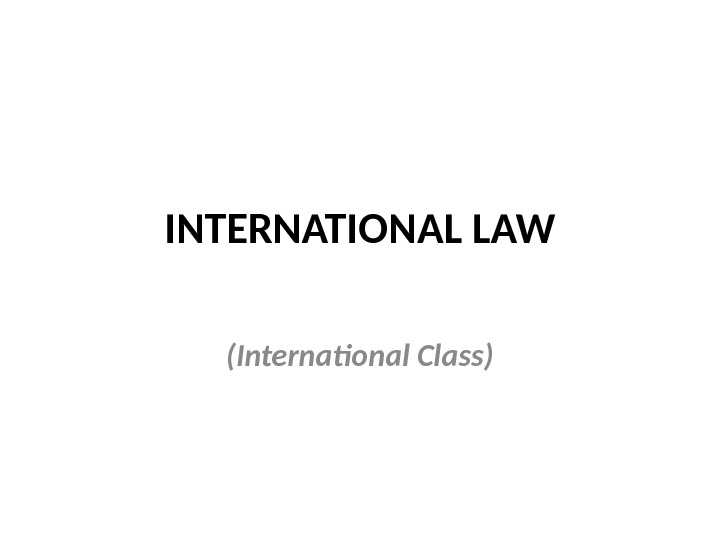

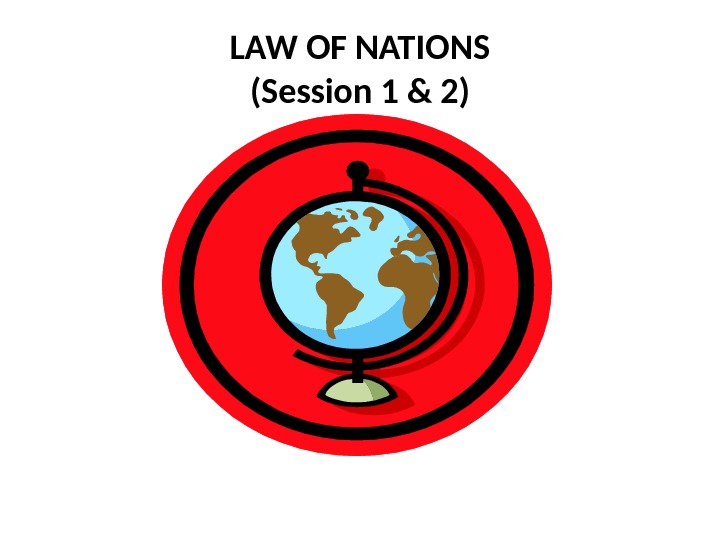


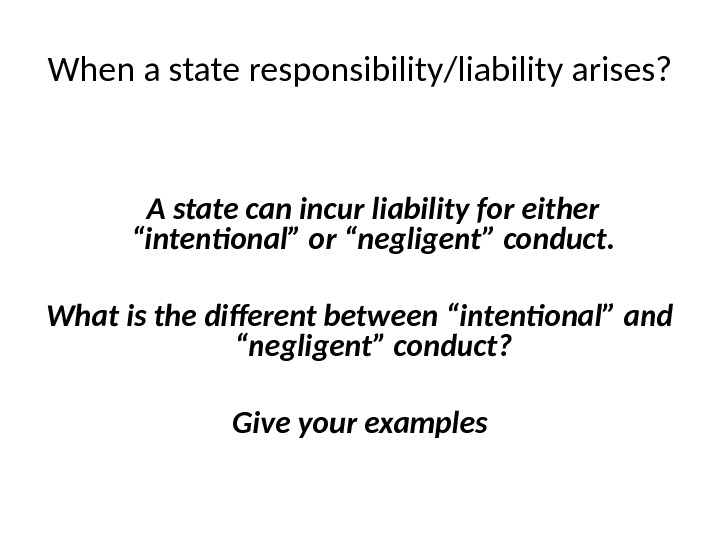
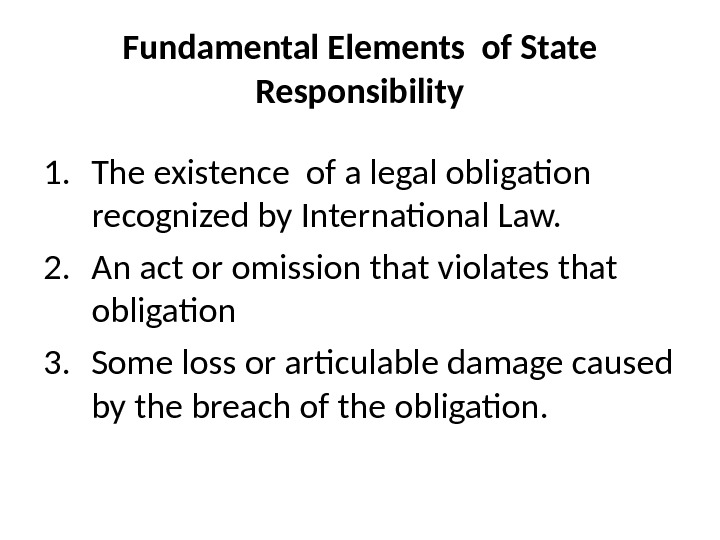

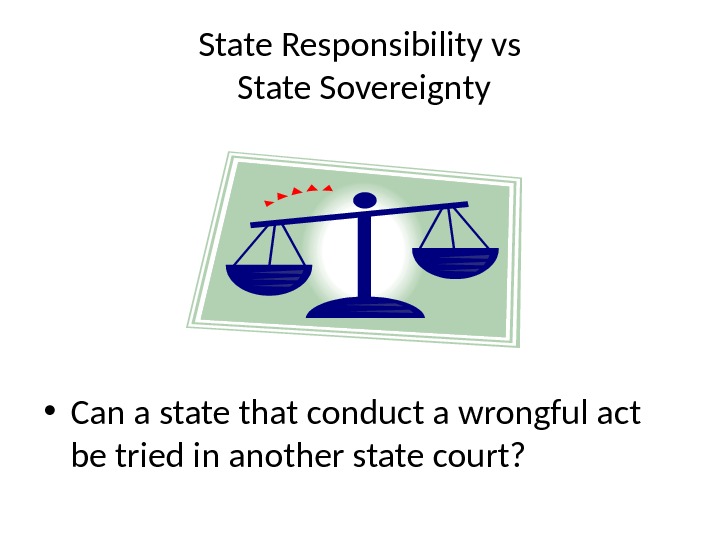
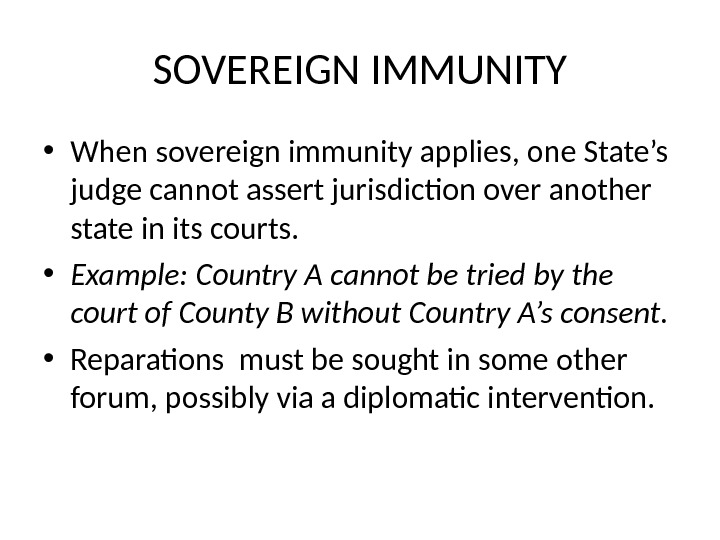


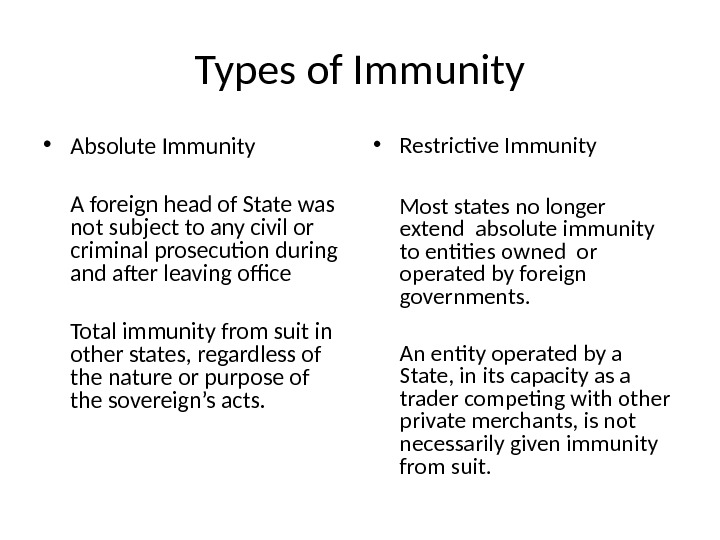




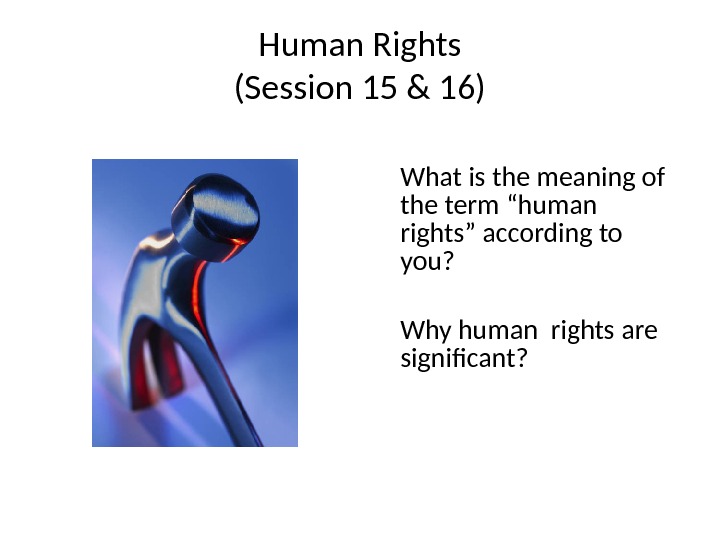
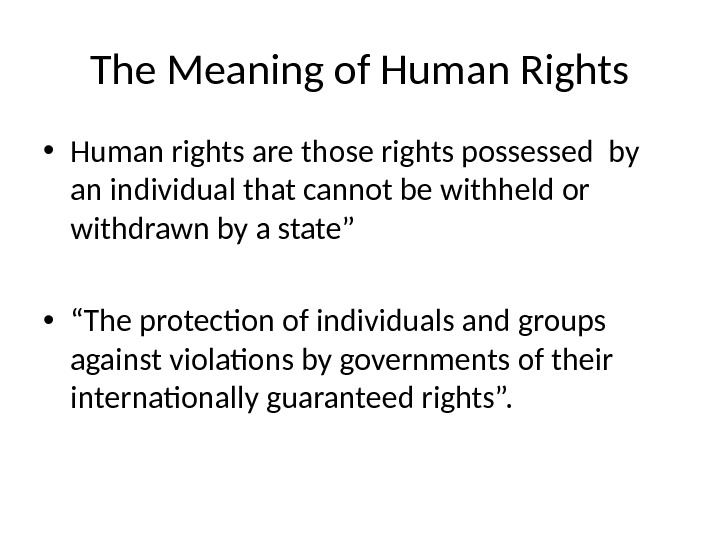

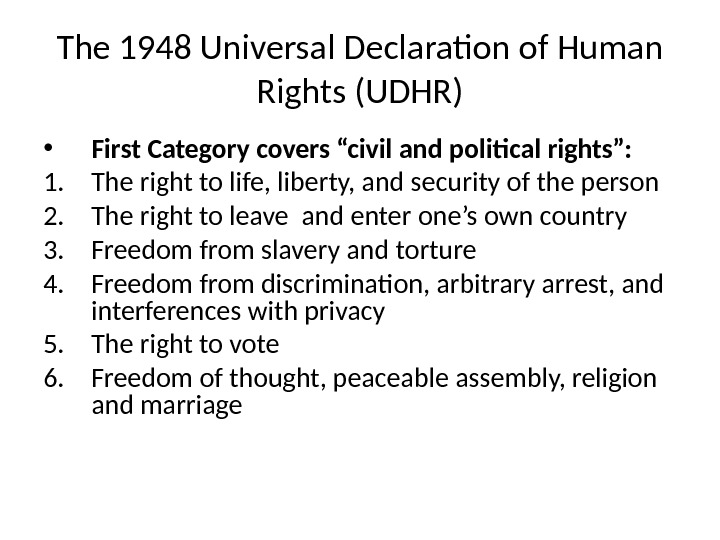
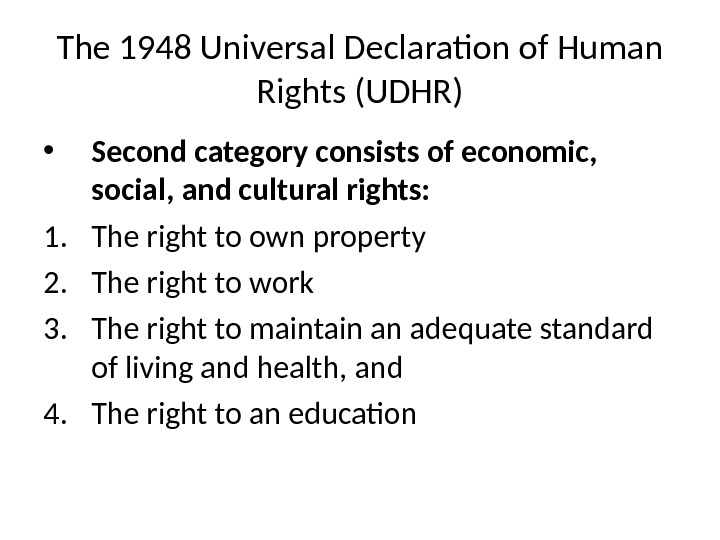

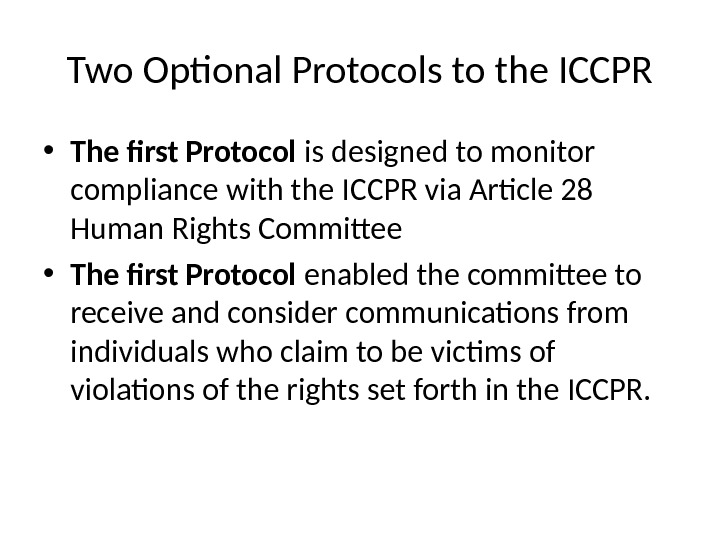
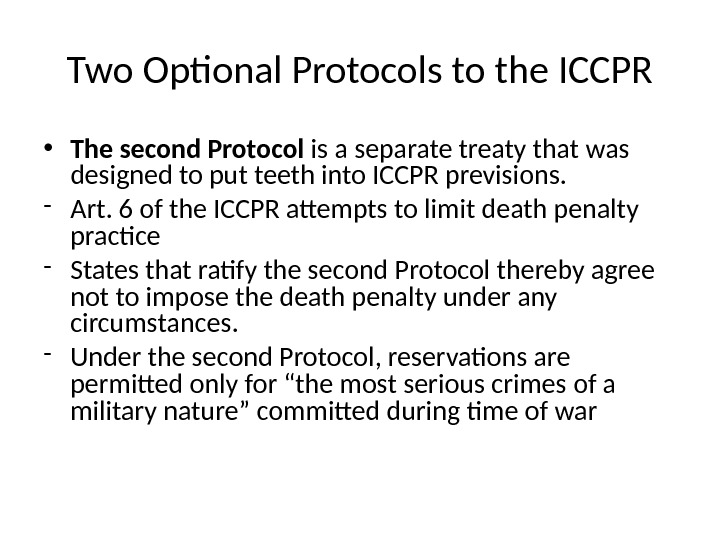


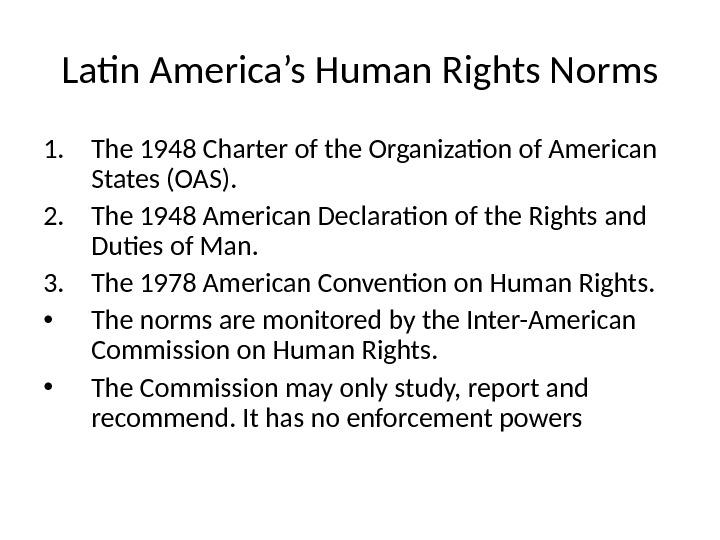


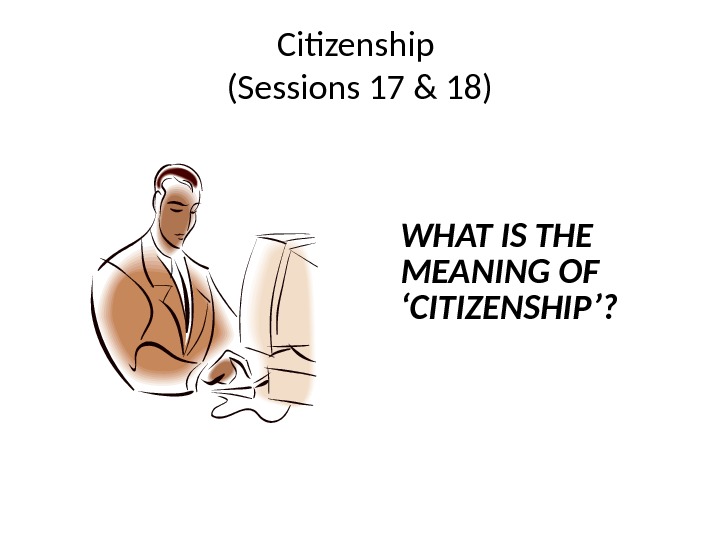
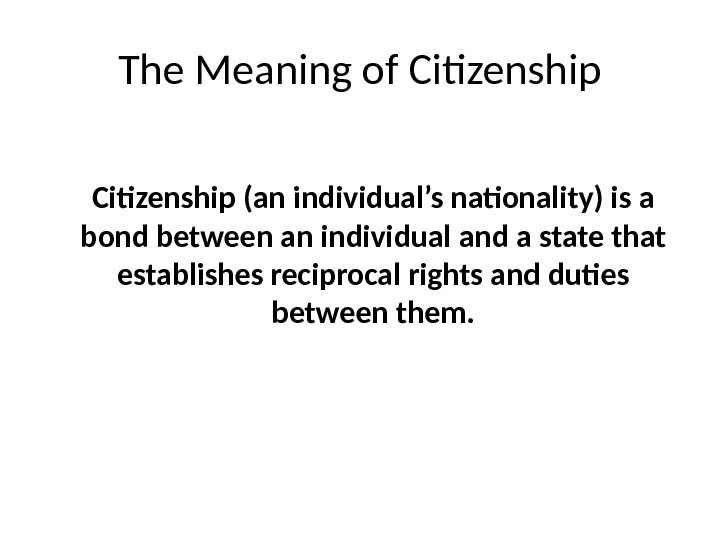
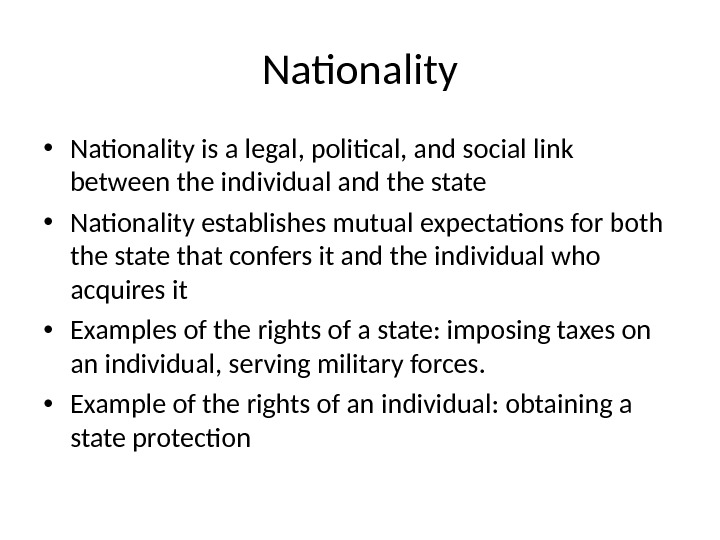
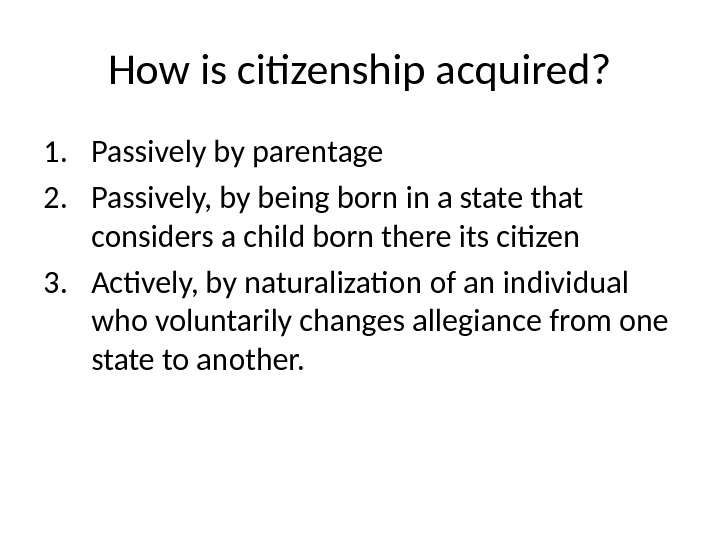
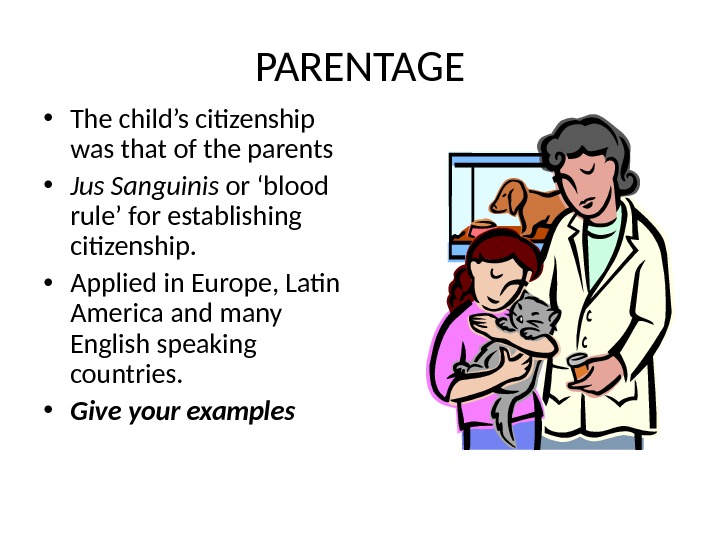

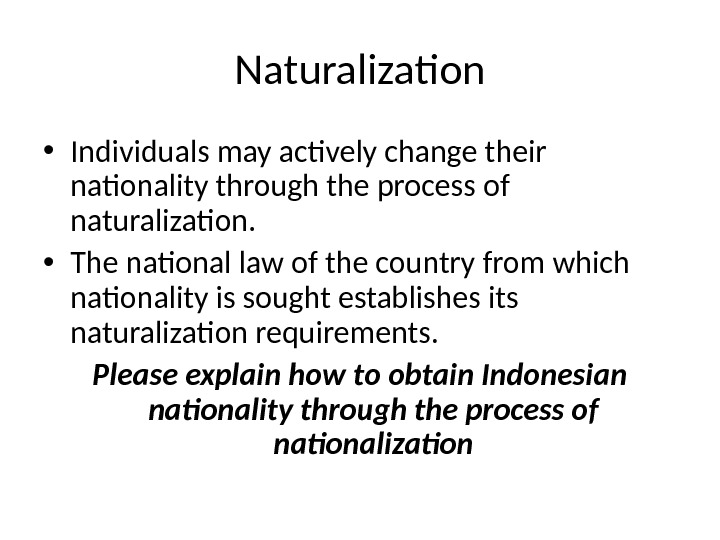
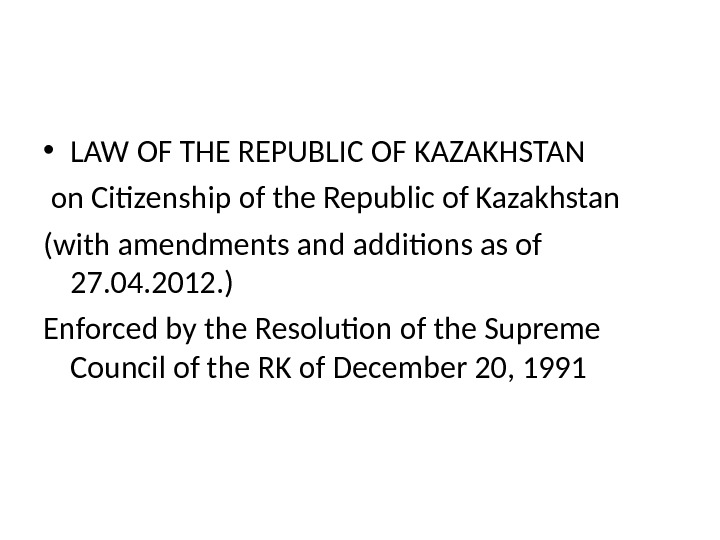

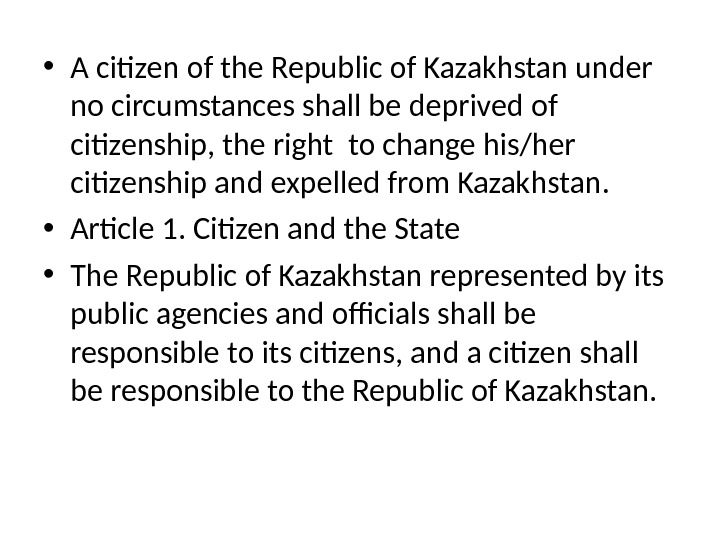
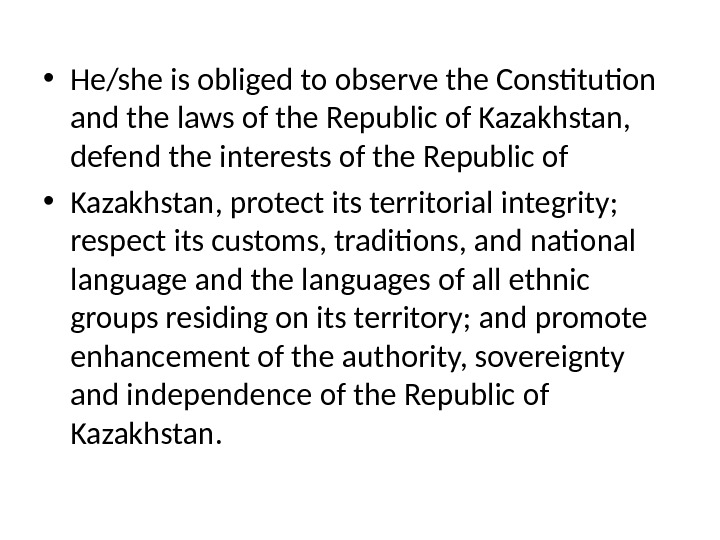
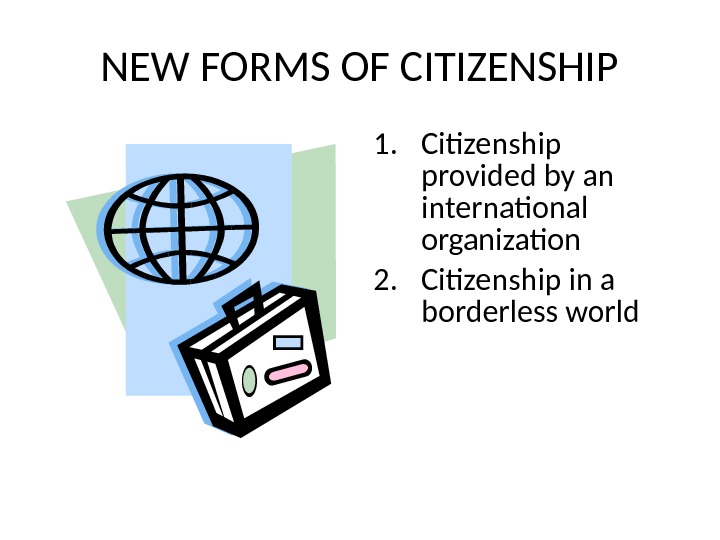
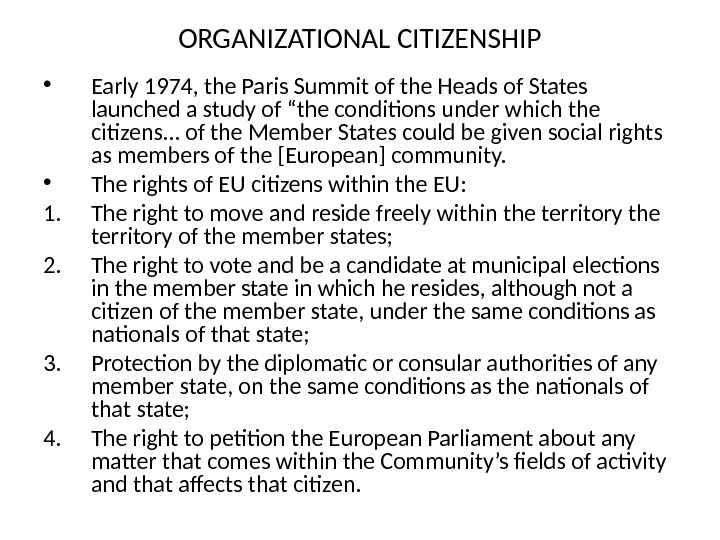

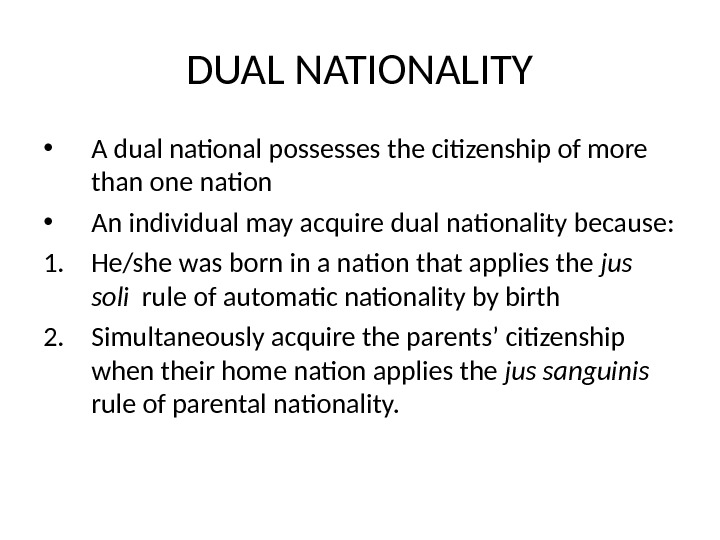
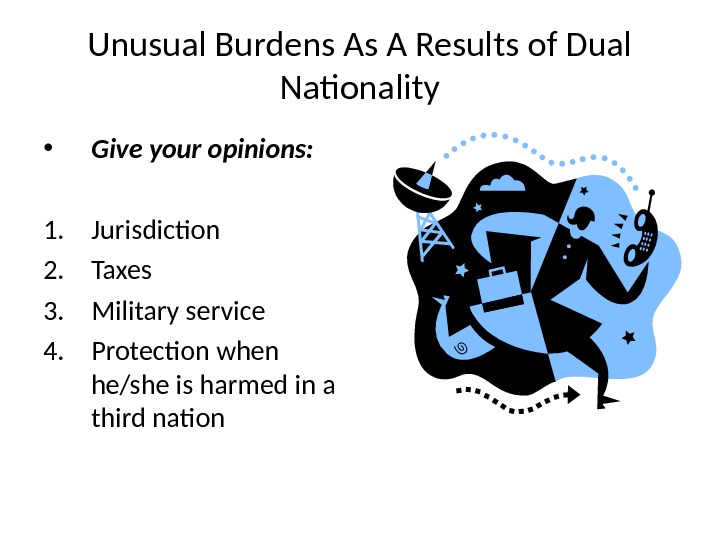

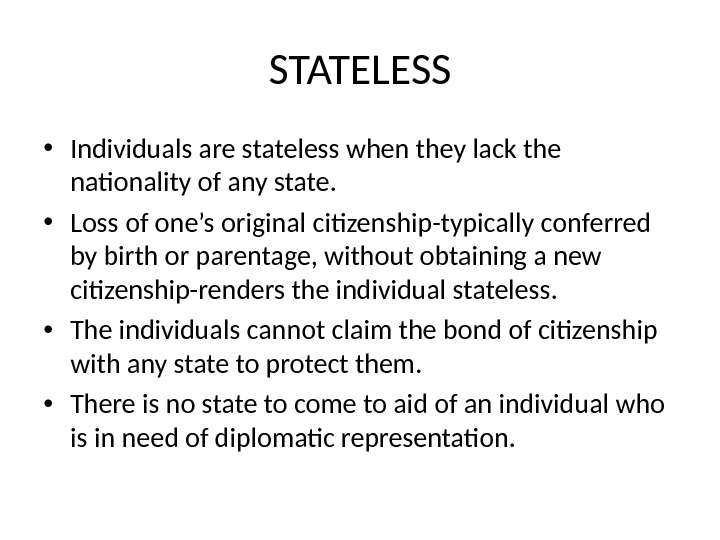

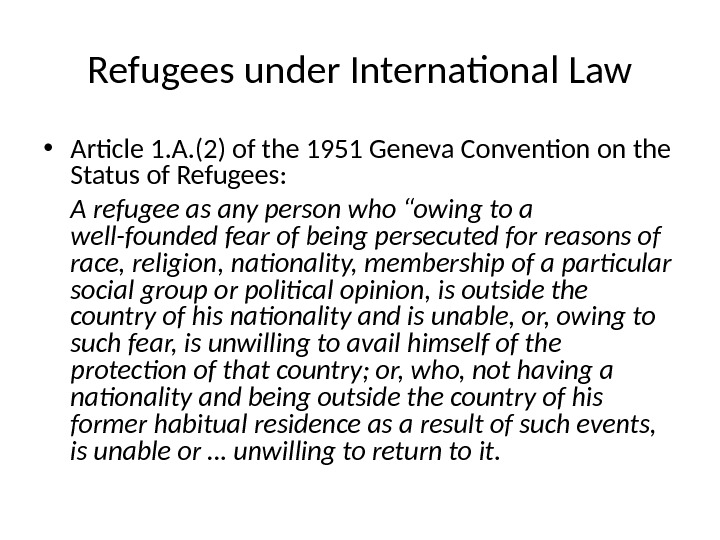



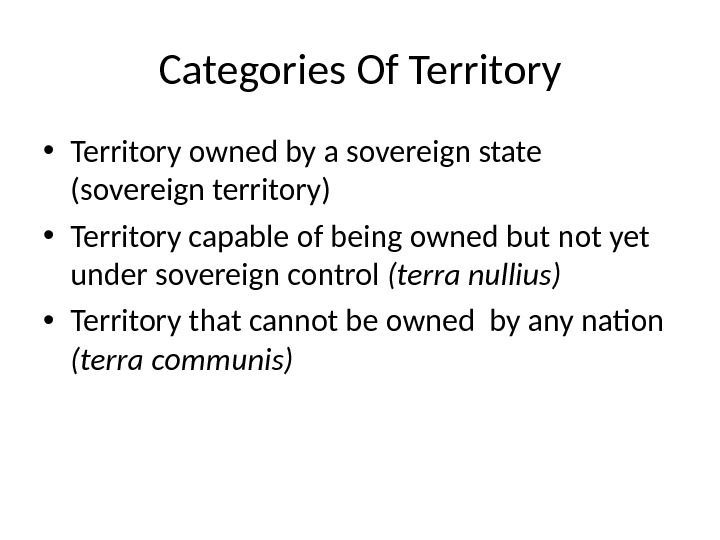
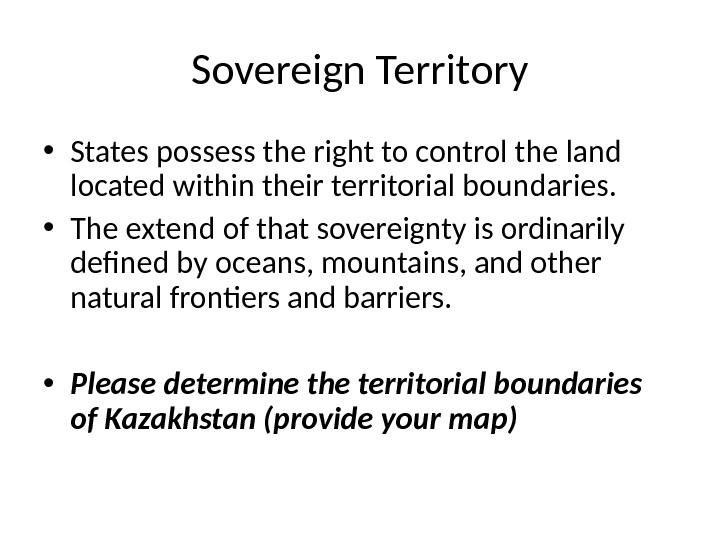

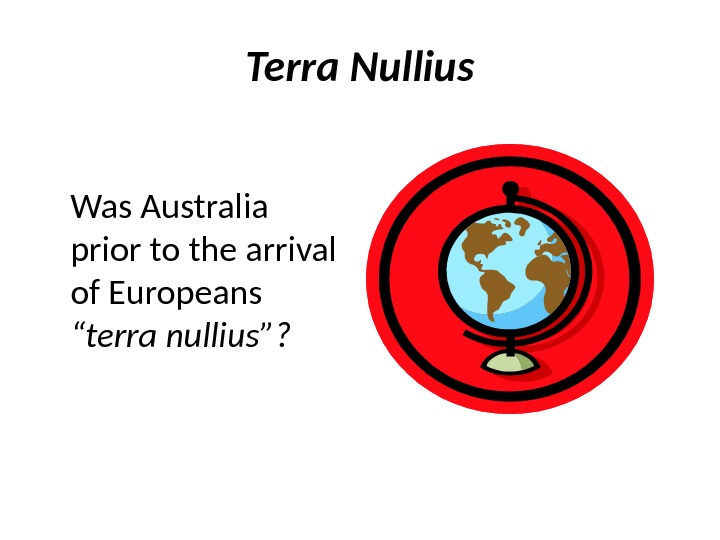


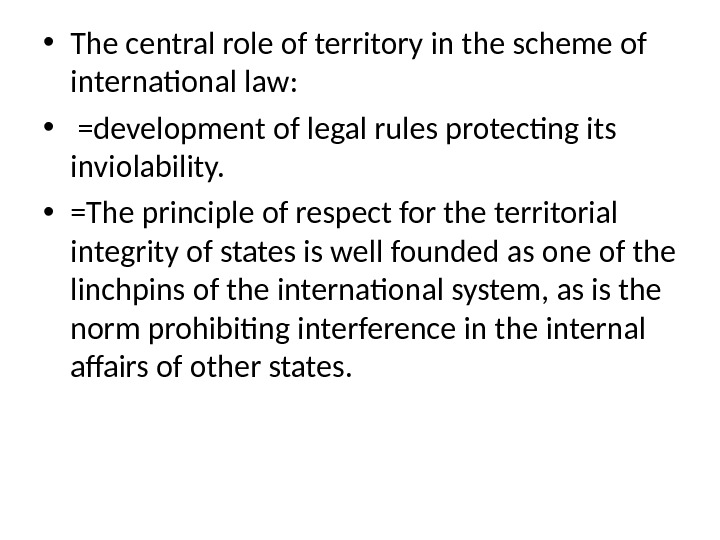

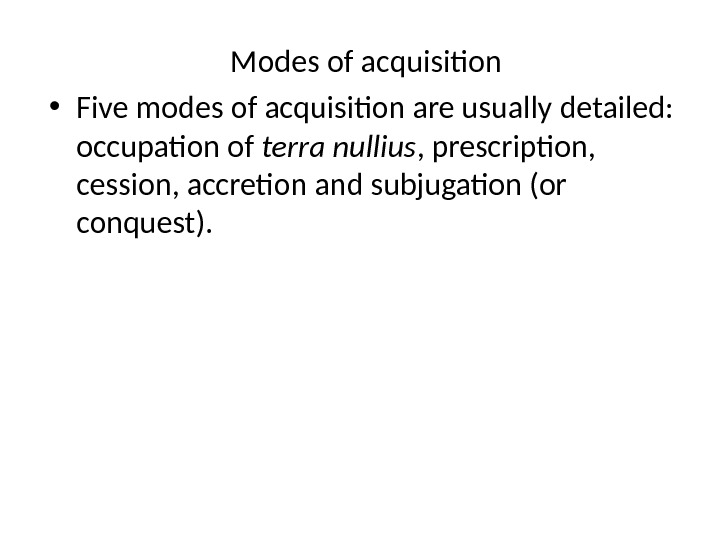
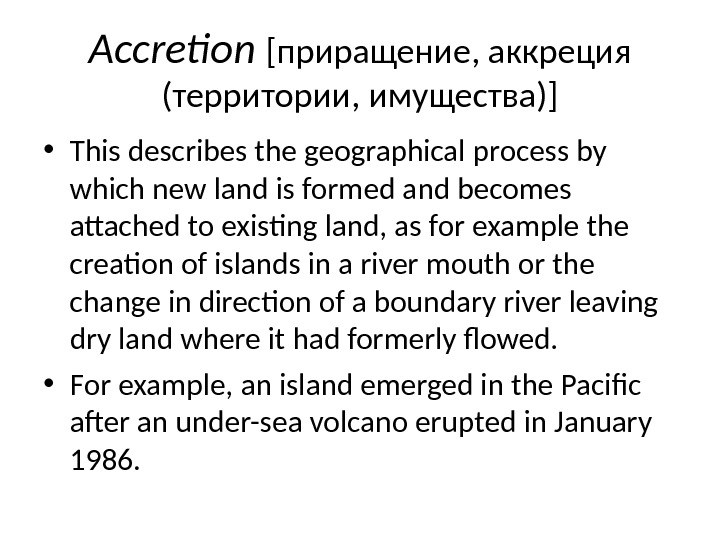


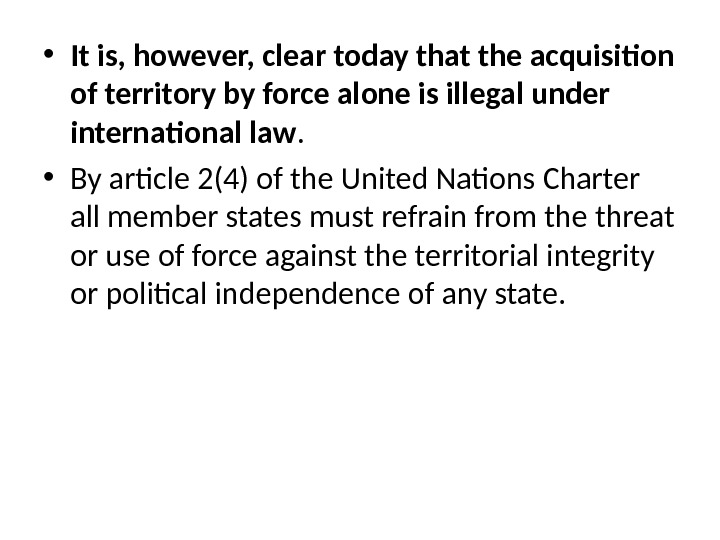

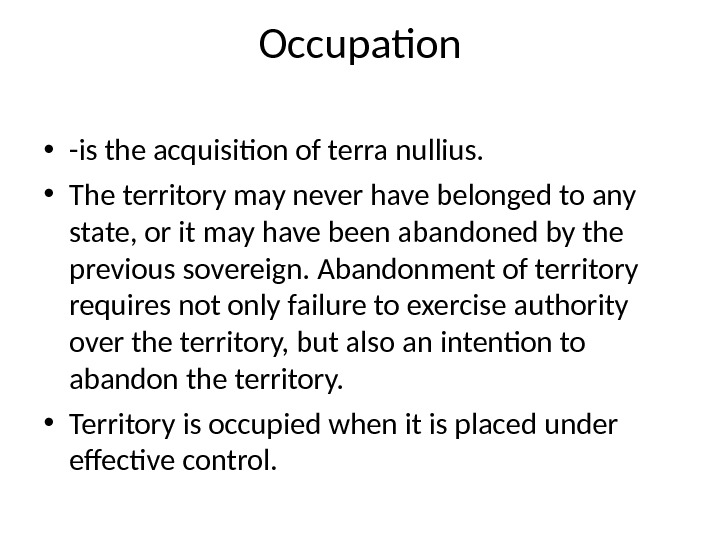
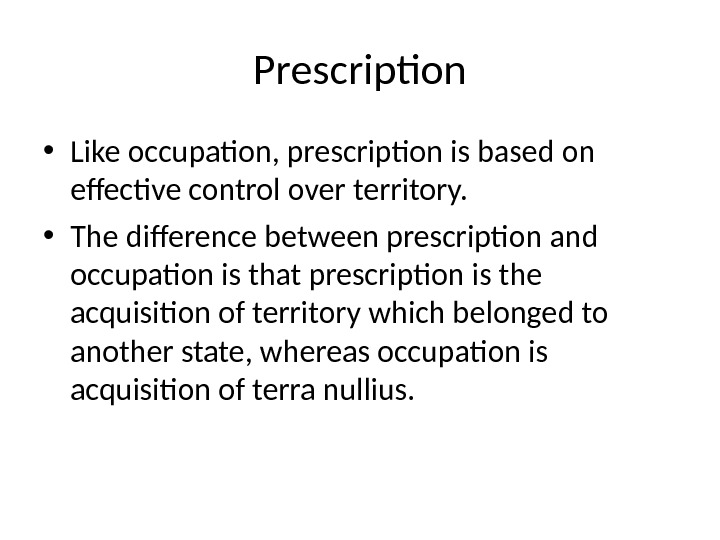
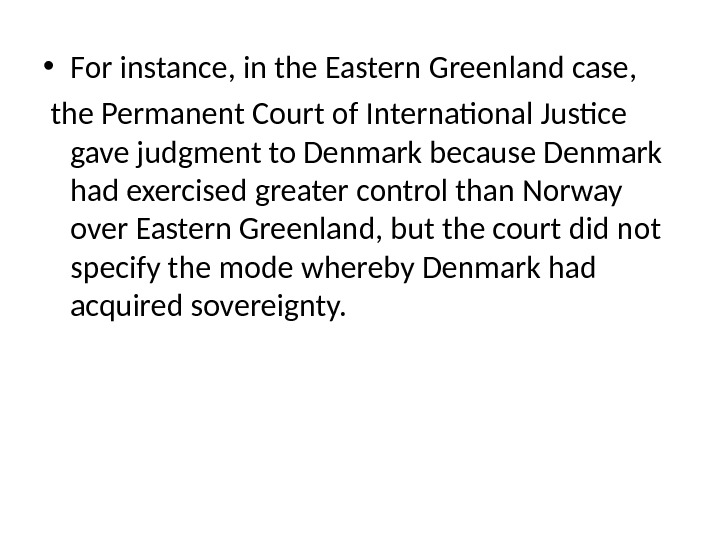

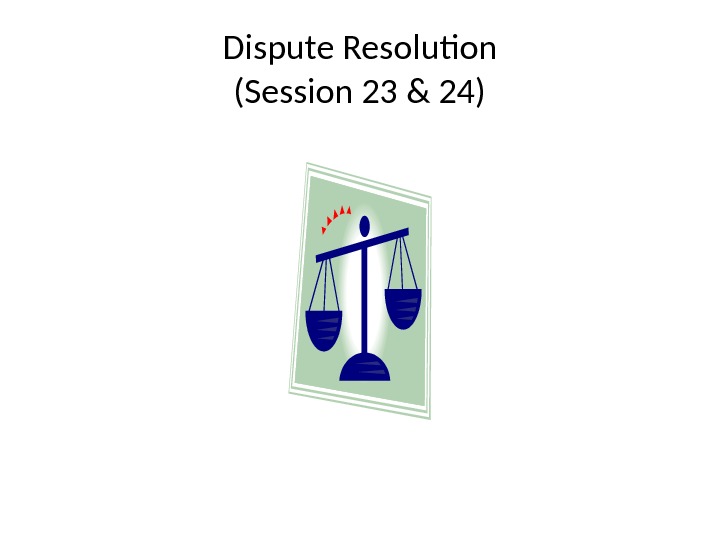
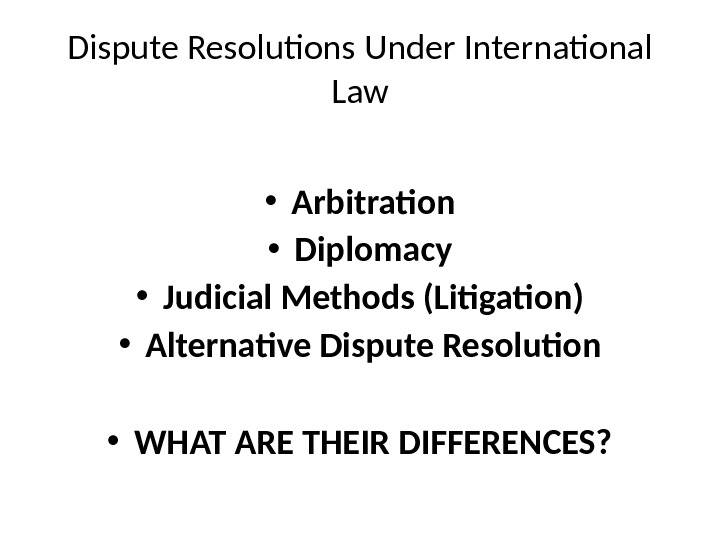
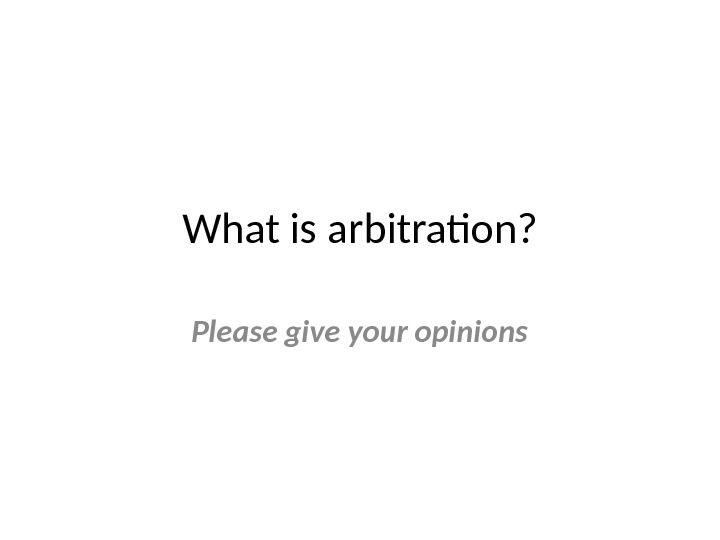
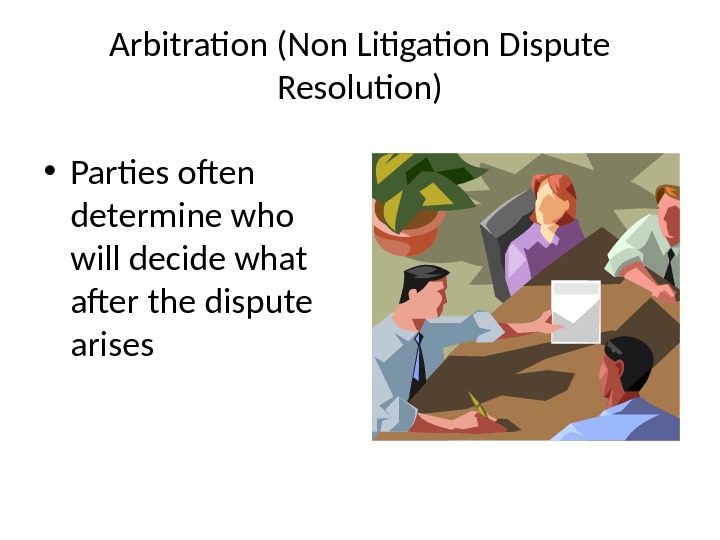
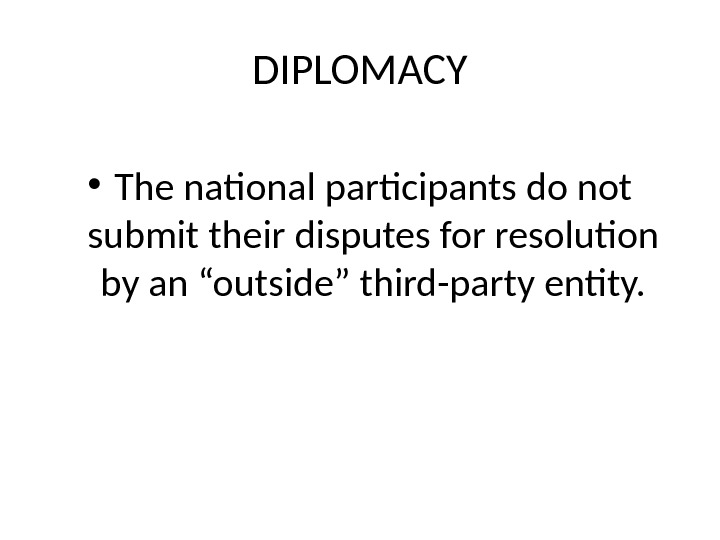



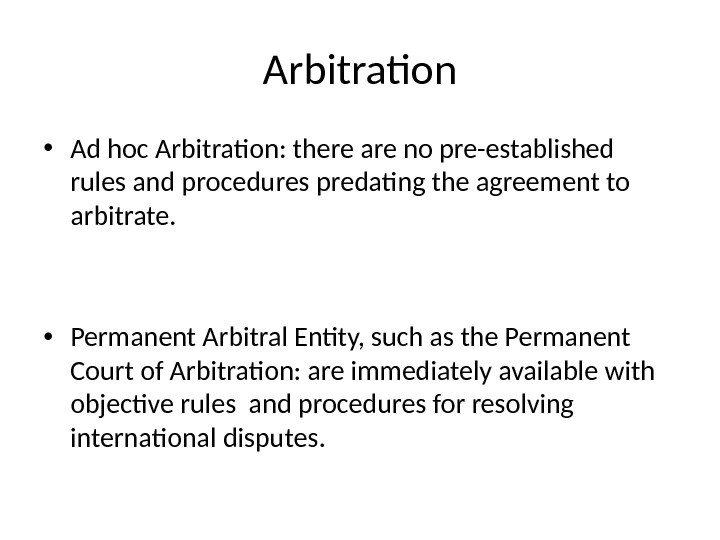
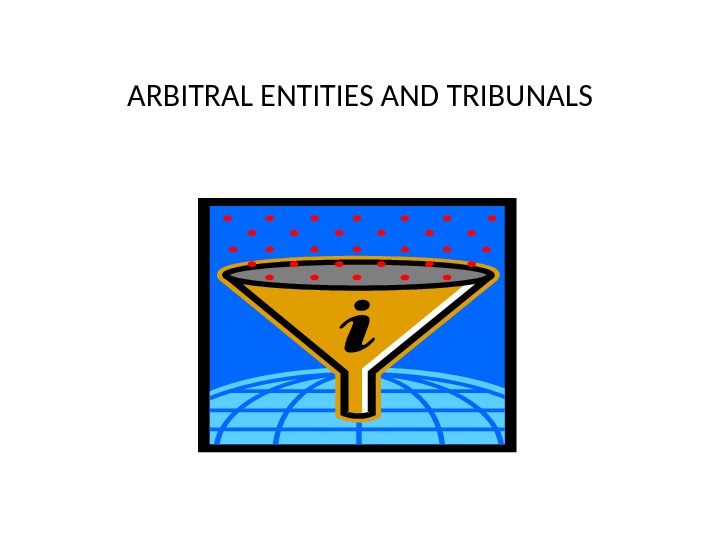
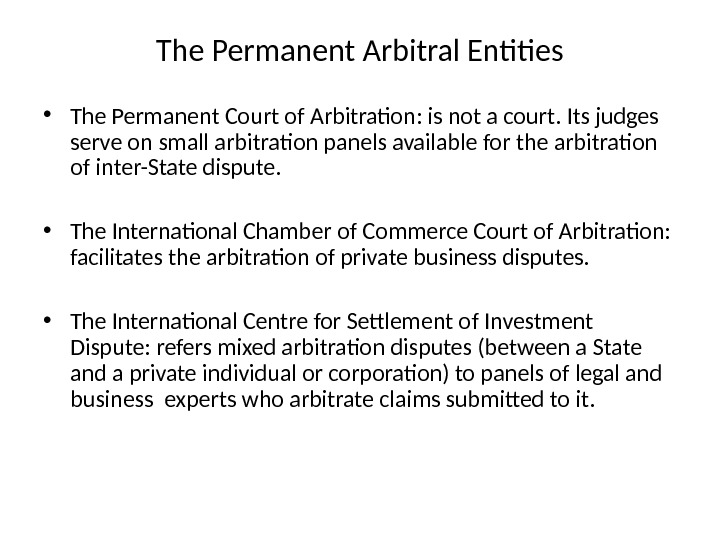
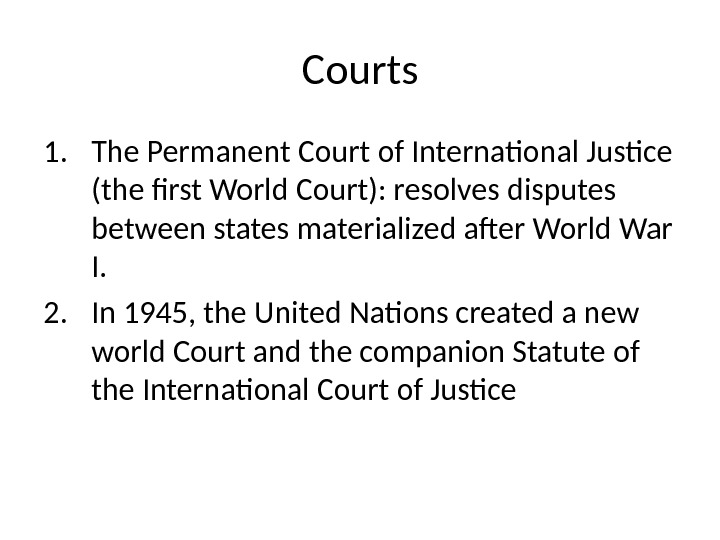
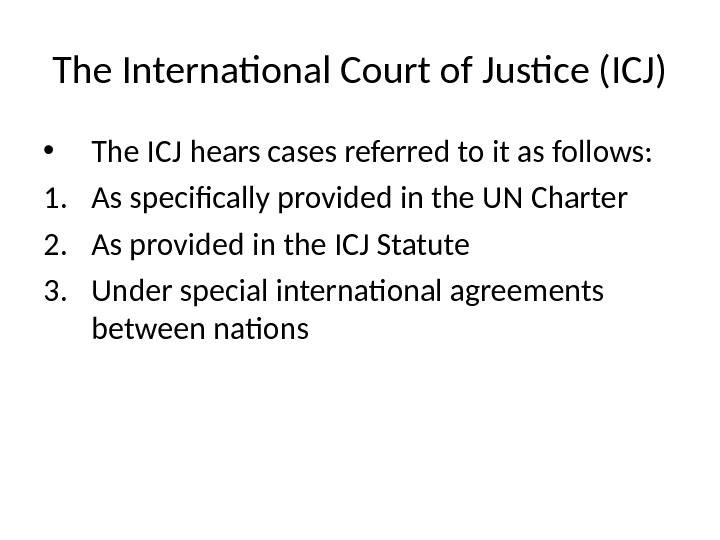
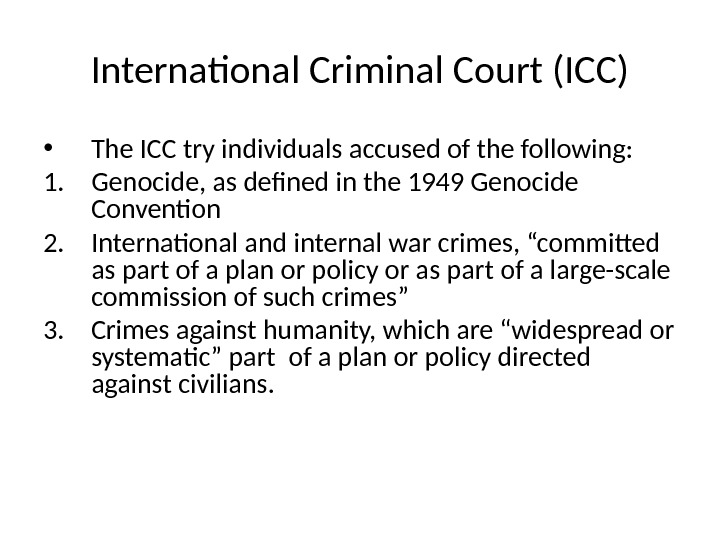
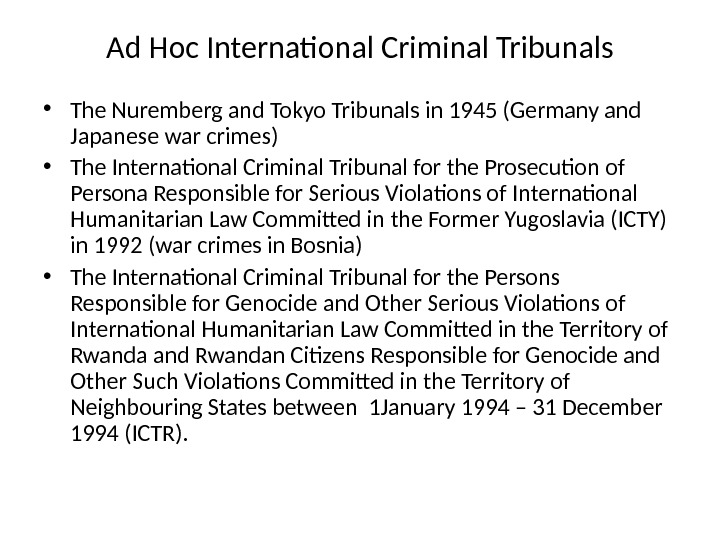

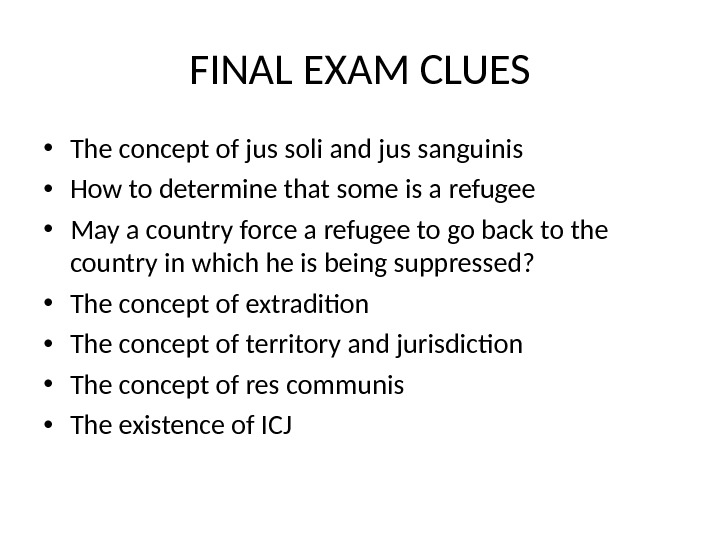

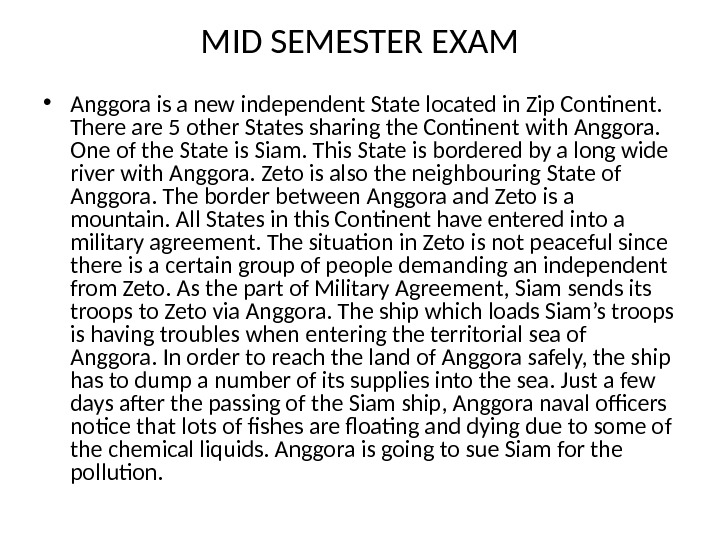
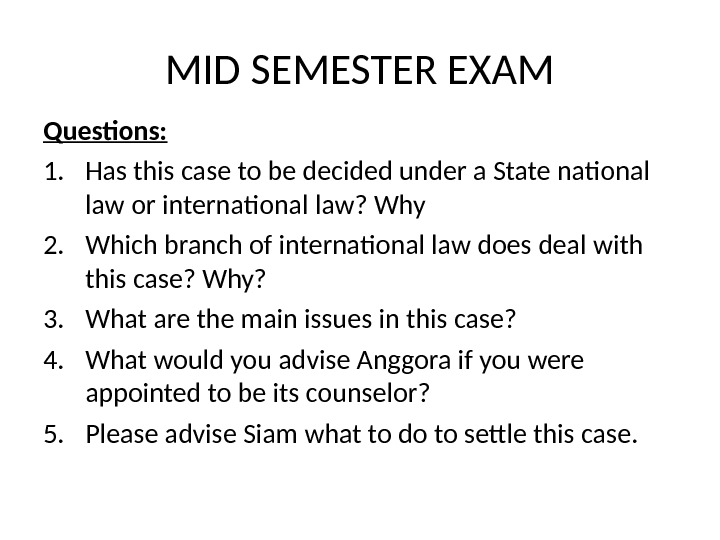
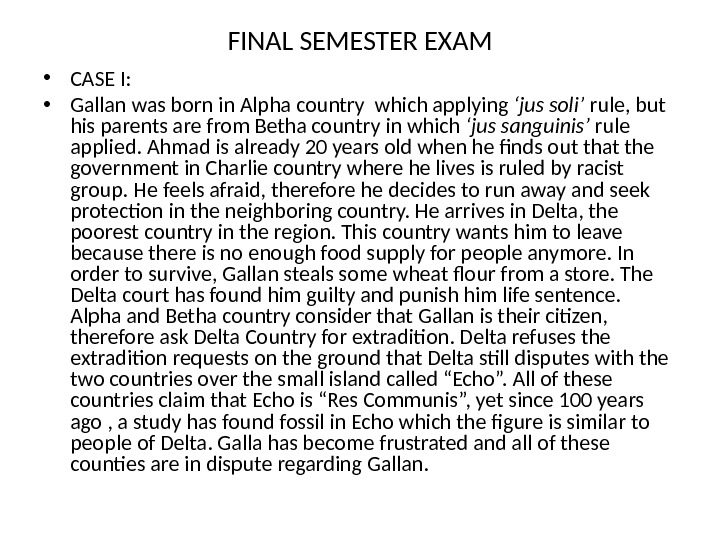

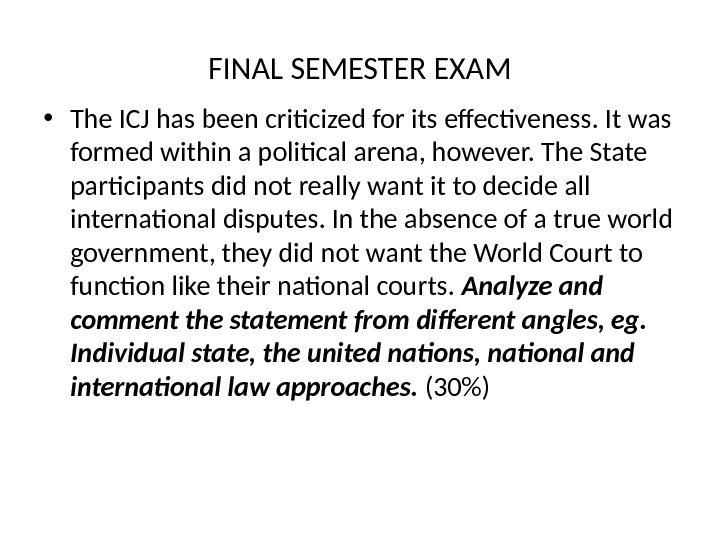
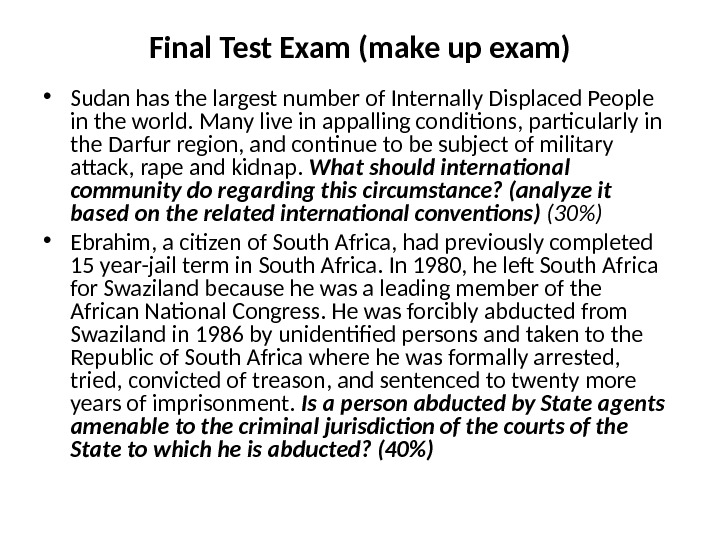


- Размер: 563.5 Кб
- Количество слайдов: 97
Описание презентации Презентация international-law по слайдам
 INTERNATIONAL LAW (International Class)
INTERNATIONAL LAW (International Class)
 Why do you want to study ‘international law’?
Why do you want to study ‘international law’?
 LAW OF NATIONS (Session 1 & 2)
LAW OF NATIONS (Session 1 & 2)
 STATE RESPONSIBILITY Session 12 & 13 What do you know about responsibilities?
STATE RESPONSIBILITY Session 12 & 13 What do you know about responsibilities?
 The meaning of responsibility under international law • Responsibility is associated with “obligations”. • State responsibility under international law means “obligations” of a state associated with its international status. • Responsibility = liability
The meaning of responsibility under international law • Responsibility is associated with “obligations”. • State responsibility under international law means “obligations” of a state associated with its international status. • Responsibility = liability
 When a state responsibility/liability arises? A state can incur liability for either “intentional” or “negligent” conduct. What is the different between “intentional” and “negligent” conduct? Give your examples
When a state responsibility/liability arises? A state can incur liability for either “intentional” or “negligent” conduct. What is the different between “intentional” and “negligent” conduct? Give your examples
 Fundamental Elements of State Responsibility 1. The existence of a legal obligation recognized by International Law. 2. An act or omission that violates that obligation 3. Some loss or articulable damage caused by the breach of the obligation.
Fundamental Elements of State Responsibility 1. The existence of a legal obligation recognized by International Law. 2. An act or omission that violates that obligation 3. Some loss or articulable damage caused by the breach of the obligation.
 Hypothetical Case A vessel of Country A passed the territorial water/sea of County B. Suddenly, the tank of the vessel leaked and sum amount of oil polluted the sea of Country B? Questions: 1. Is there a state responsibility issue in this case? 2. What area of law does this case relate to? 3. Does the conduct of Country A “a intentional” or “negligent” conduct? 4. What is the responsibility/liability of Country A? 5. What happens if Country A does not want to be responsible for its conduct?
Hypothetical Case A vessel of Country A passed the territorial water/sea of County B. Suddenly, the tank of the vessel leaked and sum amount of oil polluted the sea of Country B? Questions: 1. Is there a state responsibility issue in this case? 2. What area of law does this case relate to? 3. Does the conduct of Country A “a intentional” or “negligent” conduct? 4. What is the responsibility/liability of Country A? 5. What happens if Country A does not want to be responsible for its conduct?
 State Responsibility vs State Sovereignty • Can a state that conduct a wrongful act be tried in another state court?
State Responsibility vs State Sovereignty • Can a state that conduct a wrongful act be tried in another state court?
 SOVEREIGN IMMUNITY • When sovereign immunity applies, one State’s judge cannot assert jurisdiction over another state in its courts. • Example: Country A cannot be tried by the court of County B without Country A’s consent. • Reparations must be sought in some other forum, possibly via a diplomatic intervention.
SOVEREIGN IMMUNITY • When sovereign immunity applies, one State’s judge cannot assert jurisdiction over another state in its courts. • Example: Country A cannot be tried by the court of County B without Country A’s consent. • Reparations must be sought in some other forum, possibly via a diplomatic intervention.
 Equality of States • Why does a country have immunity from suit in the courts of another country? • Article 2. 1 of the United Nations Charter provides that “the organization is based on the principle of the sovereign equality of all its Members”
Equality of States • Why does a country have immunity from suit in the courts of another country? • Article 2. 1 of the United Nations Charter provides that “the organization is based on the principle of the sovereign equality of all its Members”
 The scope of sovereign immunity 1. States 2. Heads of State 3. State government agencies that are conducting State business
The scope of sovereign immunity 1. States 2. Heads of State 3. State government agencies that are conducting State business
 Types of Immunity • Absolute Immunity A foreign head of State was not subject to any civil or criminal prosecution during and after leaving office Total immunity from suit in other states, regardless of the nature or purpose of the sovereign’s acts. • Restrictive Immunity Most states no longer extend absolute immunity to entities owned or operated by foreign governments. An entity operated by a State, in its capacity as a trader competing with other private merchants, is not necessarily given immunity from suit.
Types of Immunity • Absolute Immunity A foreign head of State was not subject to any civil or criminal prosecution during and after leaving office Total immunity from suit in other states, regardless of the nature or purpose of the sovereign’s acts. • Restrictive Immunity Most states no longer extend absolute immunity to entities owned or operated by foreign governments. An entity operated by a State, in its capacity as a trader competing with other private merchants, is not necessarily given immunity from suit.
 Restrictive Immunity • Most States currently apply some form of the restrictive standard for resolving sovereign immunity questions • How to distinguish the application of absolute immunity from restrictive immunity: 1. sovereign versus private 2. Public versus private 3. Commercial versus non commercial 4. Political versus trade-related
Restrictive Immunity • Most States currently apply some form of the restrictive standard for resolving sovereign immunity questions • How to distinguish the application of absolute immunity from restrictive immunity: 1. sovereign versus private 2. Public versus private 3. Commercial versus non commercial 4. Political versus trade-related
 Make A Hypothetical Case Regarding Absolute and Restrictive Immunity Please Work With Your Partner
Make A Hypothetical Case Regarding Absolute and Restrictive Immunity Please Work With Your Partner
 Thank You && See You Again In The Next Sessions
Thank You && See You Again In The Next Sessions
 Thank You && See You In Mid Semester Exam
Thank You && See You In Mid Semester Exam
 Human Rights (Session 15 & 16) What is the meaning of the term “human rights” according to you? Why human rights are significant?
Human Rights (Session 15 & 16) What is the meaning of the term “human rights” according to you? Why human rights are significant?
 The Meaning of Human Rights • Human rights are those rights possessed by an individual that cannot be withheld or withdrawn by a state” • “ The protection of individuals and groups against violations by governments of their internationally guaranteed rights”.
The Meaning of Human Rights • Human rights are those rights possessed by an individual that cannot be withheld or withdrawn by a state” • “ The protection of individuals and groups against violations by governments of their internationally guaranteed rights”.
 International Bill of Human Rights 1. The 1948 Universal Declaration of Human Rights (UDHR) 2. The 1966 International Covenant on Civil and Political Rights (ICCPR) 3. Its two optional protocols 4. The 1966 International Covenant on Economic, Social, and Cultural Rights (ICESCR).
International Bill of Human Rights 1. The 1948 Universal Declaration of Human Rights (UDHR) 2. The 1966 International Covenant on Civil and Political Rights (ICCPR) 3. Its two optional protocols 4. The 1966 International Covenant on Economic, Social, and Cultural Rights (ICESCR).
 The 1948 Universal Declaration of Human Rights (UDHR) • First Category covers “civil and political rights”: 1. The right to life, liberty, and security of the person 2. The right to leave and enter one’s own country 3. Freedom from slavery and torture 4. Freedom from discrimination, arbitrary arrest, and interferences with privacy 5. The right to vote 6. Freedom of thought, peaceable assembly, religion and marriage
The 1948 Universal Declaration of Human Rights (UDHR) • First Category covers “civil and political rights”: 1. The right to life, liberty, and security of the person 2. The right to leave and enter one’s own country 3. Freedom from slavery and torture 4. Freedom from discrimination, arbitrary arrest, and interferences with privacy 5. The right to vote 6. Freedom of thought, peaceable assembly, religion and marriage
 The 1948 Universal Declaration of Human Rights (UDHR) • Second category consists of economic, social, and cultural rights: 1. The right to own property 2. The right to work 3. The right to maintain an adequate standard of living and health, and 4. The right to an education
The 1948 Universal Declaration of Human Rights (UDHR) • Second category consists of economic, social, and cultural rights: 1. The right to own property 2. The right to work 3. The right to maintain an adequate standard of living and health, and 4. The right to an education
 Is this case against Human Rights? (Indonesian Case) Let’s watch, analyze, criticize and make recommendations regarding the movie
Is this case against Human Rights? (Indonesian Case) Let’s watch, analyze, criticize and make recommendations regarding the movie
 Two Optional Protocols to the ICCPR • The first Protocol is designed to monitor compliance with the ICCPR via Article 28 Human Rights Committee • The first Protocol enabled the committee to receive and consider communications from individuals who claim to be victims of violations of the rights set forth in the ICCPR.
Two Optional Protocols to the ICCPR • The first Protocol is designed to monitor compliance with the ICCPR via Article 28 Human Rights Committee • The first Protocol enabled the committee to receive and consider communications from individuals who claim to be victims of violations of the rights set forth in the ICCPR.
 Two Optional Protocols to the ICCPR • The second Protocol is a separate treaty that was designed to put teeth into ICCPR previsions. — Art. 6 of the ICCPR attempts to limit death penalty practice — States that ratify the second Protocol thereby agree not to impose the death penalty under any circumstances. — Under the second Protocol, reservations are permitted only for “the most serious crimes of a military nature” committed during time of war
Two Optional Protocols to the ICCPR • The second Protocol is a separate treaty that was designed to put teeth into ICCPR previsions. — Art. 6 of the ICCPR attempts to limit death penalty practice — States that ratify the second Protocol thereby agree not to impose the death penalty under any circumstances. — Under the second Protocol, reservations are permitted only for “the most serious crimes of a military nature” committed during time of war
 The 1966 International Covenant on Economic, Social, and Cultural Rights (ICESCR) • The ICESCR requires state parties to provide adequate or improved living conditions for its inhabitants and to facilitate international cooperation to achieve this objective. • The essential provisions: articles 3, 6, 7, 9, 11, 10, 11, 13, 15, 16, 17. Your task is to explain the contents of each article
The 1966 International Covenant on Economic, Social, and Cultural Rights (ICESCR) • The ICESCR requires state parties to provide adequate or improved living conditions for its inhabitants and to facilitate international cooperation to achieve this objective. • The essential provisions: articles 3, 6, 7, 9, 11, 10, 11, 13, 15, 16, 17. Your task is to explain the contents of each article
 Human Rights Treaties in Europe 1. The European Human Rights Convention (ECHR) contains civil and political rights that are virtually identical to those set forth in the UN Covenant on Civil and Political Rights. 2. The European Social Charter contains the same economic and social rights set forth in the UN Covenant on Economic, Social and Cultural Rights. • The Executive Body is the Council of Ministers • The Judicial Body is the European Court of Human Rights.
Human Rights Treaties in Europe 1. The European Human Rights Convention (ECHR) contains civil and political rights that are virtually identical to those set forth in the UN Covenant on Civil and Political Rights. 2. The European Social Charter contains the same economic and social rights set forth in the UN Covenant on Economic, Social and Cultural Rights. • The Executive Body is the Council of Ministers • The Judicial Body is the European Court of Human Rights.
 Latin America’s Human Rights Norms 1. The 1948 Charter of the Organization of American States (OAS). 2. The 1948 American Declaration of the Rights and Duties of Man. 3. The 1978 American Convention on Human Rights. • The norms are monitored by the Inter-American Commission on Human Rights. • The Commission may only study, report and recommend. It has no enforcement powers
Latin America’s Human Rights Norms 1. The 1948 Charter of the Organization of American States (OAS). 2. The 1948 American Declaration of the Rights and Duties of Man. 3. The 1978 American Convention on Human Rights. • The norms are monitored by the Inter-American Commission on Human Rights. • The Commission may only study, report and recommend. It has no enforcement powers
 Africa’s Human Rights Program • The 1986 African Charter on Human and People’s Rights. • The 1986 African Charter contains many of the human rights principles mentioned in the UN Charter and the UN Universal Declaration of Human Rights • The 1986 African Charter established the African Commission on Human Rights, which monitors human rights enforcement on the African Continent. • The Commission may only study, report and recommend. It has no enforcement powers
Africa’s Human Rights Program • The 1986 African Charter on Human and People’s Rights. • The 1986 African Charter contains many of the human rights principles mentioned in the UN Charter and the UN Universal Declaration of Human Rights • The 1986 African Charter established the African Commission on Human Rights, which monitors human rights enforcement on the African Continent. • The Commission may only study, report and recommend. It has no enforcement powers
 Thank You && See You Again In The Next Sessions
Thank You && See You Again In The Next Sessions
 Citizenship (Sessions 17 & 18) WHAT IS THE MEANING OF ‘CITIZENSHIP’?
Citizenship (Sessions 17 & 18) WHAT IS THE MEANING OF ‘CITIZENSHIP’?
 The Meaning of Citizenship (an individual’s nationality) is a bond between an individual and a state that establishes reciprocal rights and duties between them.
The Meaning of Citizenship (an individual’s nationality) is a bond between an individual and a state that establishes reciprocal rights and duties between them.
 Nationality • Nationality is a legal, political, and social link between the individual and the state • Nationality establishes mutual expectations for both the state that confers it and the individual who acquires it • Examples of the rights of a state: imposing taxes on an individual, serving military forces. • Example of the rights of an individual: obtaining a state protection
Nationality • Nationality is a legal, political, and social link between the individual and the state • Nationality establishes mutual expectations for both the state that confers it and the individual who acquires it • Examples of the rights of a state: imposing taxes on an individual, serving military forces. • Example of the rights of an individual: obtaining a state protection
 How is citizenship acquired? 1. Passively by parentage 2. Passively, by being born in a state that considers a child born there its citizen 3. Actively, by naturalization of an individual who voluntarily changes allegiance from one state to another.
How is citizenship acquired? 1. Passively by parentage 2. Passively, by being born in a state that considers a child born there its citizen 3. Actively, by naturalization of an individual who voluntarily changes allegiance from one state to another.
 PARENTAGE • The child’s citizenship was that of the parents • Jus Sanguinis or ‘blood rule’ for establishing citizenship. • Applied in Europe, Latin America and many English speaking countries. • Give your examples
PARENTAGE • The child’s citizenship was that of the parents • Jus Sanguinis or ‘blood rule’ for establishing citizenship. • Applied in Europe, Latin America and many English speaking countries. • Give your examples
 BIRTH • A nationality by birth rule. • Jus soli or “soil rule” for determining citizenship. • Give your examples
BIRTH • A nationality by birth rule. • Jus soli or “soil rule” for determining citizenship. • Give your examples
 Naturalization • Individuals may actively change their nationality through the process of naturalization. • The national law of the country from which nationality is sought establishes its naturalization requirements. Please explain how to obtain Indonesian nationality through the process of nationalization
Naturalization • Individuals may actively change their nationality through the process of naturalization. • The national law of the country from which nationality is sought establishes its naturalization requirements. Please explain how to obtain Indonesian nationality through the process of nationalization
 • LAW OF THE REPUBLIC OF KAZAKHSTAN on Citizenship of the Republic of Kazakhstan (with amendments and additions as of 27. 04. 2012. ) Enforced by the Resolution of the Supreme Council of the RK of December 20,
• LAW OF THE REPUBLIC OF KAZAKHSTAN on Citizenship of the Republic of Kazakhstan (with amendments and additions as of 27. 04. 2012. ) Enforced by the Resolution of the Supreme Council of the RK of December 20,
 • The citizenship of the Republic of Kazakhstan determines the stable political and legal relationship of an individual with a state and reflects their mutual rights and obligations. • Each individual in the Republic of Kazakhstan has the right to citizenship. Citizenship of the Republic of Kazakhstan is acquired and terminated in accordance with this Law.
• The citizenship of the Republic of Kazakhstan determines the stable political and legal relationship of an individual with a state and reflects their mutual rights and obligations. • Each individual in the Republic of Kazakhstan has the right to citizenship. Citizenship of the Republic of Kazakhstan is acquired and terminated in accordance with this Law.
 • A citizen of the Republic of Kazakhstan under no circumstances shall be deprived of citizenship, the right to change his/her citizenship and expelled from Kazakhstan. • Article 1. Citizen and the State • The Republic of Kazakhstan represented by its public agencies and officials shall be responsible to its citizens, and a citizen shall be responsible to the Republic of Kazakhstan.
• A citizen of the Republic of Kazakhstan under no circumstances shall be deprived of citizenship, the right to change his/her citizenship and expelled from Kazakhstan. • Article 1. Citizen and the State • The Republic of Kazakhstan represented by its public agencies and officials shall be responsible to its citizens, and a citizen shall be responsible to the Republic of Kazakhstan.
 • He/she is obliged to observe the Constitution and the laws of the Republic of Kazakhstan, defend the interests of the Republic of • Kazakhstan, protect its territorial integrity; respect its customs, traditions, and national language and the languages of all ethnic groups residing on its territory; and promote enhancement of the authority, sovereignty and independence of the Republic of Kazakhstan.
• He/she is obliged to observe the Constitution and the laws of the Republic of Kazakhstan, defend the interests of the Republic of • Kazakhstan, protect its territorial integrity; respect its customs, traditions, and national language and the languages of all ethnic groups residing on its territory; and promote enhancement of the authority, sovereignty and independence of the Republic of Kazakhstan.
 NEW FORMS OF CITIZENSHIP 1. Citizenship provided by an international organization 2. Citizenship in a borderless world
NEW FORMS OF CITIZENSHIP 1. Citizenship provided by an international organization 2. Citizenship in a borderless world
 ORGANIZATIONAL CITIZENSHIP • Early 1974, the Paris Summit of the Heads of States launched a study of “the conditions under which the citizens… of the Member States could be given social rights as members of the [European] community. • The rights of EU citizens within the EU: 1. The right to move and reside freely within the territory of the member states; 2. The right to vote and be a candidate at municipal elections in the member state in which he resides, although not a citizen of the member state, under the same conditions as nationals of that state; 3. Protection by the diplomatic or consular authorities of any member state, on the same conditions as the nationals of that state; 4. The right to petition the European Parliament about any matter that comes within the Community’s fields of activity and that affects that citizen.
ORGANIZATIONAL CITIZENSHIP • Early 1974, the Paris Summit of the Heads of States launched a study of “the conditions under which the citizens… of the Member States could be given social rights as members of the [European] community. • The rights of EU citizens within the EU: 1. The right to move and reside freely within the territory of the member states; 2. The right to vote and be a candidate at municipal elections in the member state in which he resides, although not a citizen of the member state, under the same conditions as nationals of that state; 3. Protection by the diplomatic or consular authorities of any member state, on the same conditions as the nationals of that state; 4. The right to petition the European Parliament about any matter that comes within the Community’s fields of activity and that affects that citizen.
 CITIZENSHIP IN A BORDERLESS WORLD • With the advent of the information age, or the electronic world of ‘cyberspace’, citizen one day may not be dependent on the relationship between the individual and the state. • Globalization will revise the degree to which nation-states are sovereign as borders become less relevant to our daily lives.
CITIZENSHIP IN A BORDERLESS WORLD • With the advent of the information age, or the electronic world of ‘cyberspace’, citizen one day may not be dependent on the relationship between the individual and the state. • Globalization will revise the degree to which nation-states are sovereign as borders become less relevant to our daily lives.
 DUAL NATIONALITY • A dual national possesses the citizenship of more than one nation • An individual may acquire dual nationality because: 1. He/she was born in a nation that applies the jus soli rule of automatic nationality by birth 2. Simultaneously acquire the parents’ citizenship when their home nation applies the jus sanguinis rule of parental nationality.
DUAL NATIONALITY • A dual national possesses the citizenship of more than one nation • An individual may acquire dual nationality because: 1. He/she was born in a nation that applies the jus soli rule of automatic nationality by birth 2. Simultaneously acquire the parents’ citizenship when their home nation applies the jus sanguinis rule of parental nationality.
 Unusual Burdens As A Results of Dual Nationality • Give your opinions: 1. Jurisdiction 2. Taxes 3. Military service 4. Protection when he/she is harmed in a third nation
Unusual Burdens As A Results of Dual Nationality • Give your opinions: 1. Jurisdiction 2. Taxes 3. Military service 4. Protection when he/she is harmed in a third nation
 STATELESS • WHAT DO YOU KNOW ABOUT ‘A STATELESS’ PERSON? • CAN YOU GIVE EXAMPLES WHAT CAUSES THE STATUS OF STATELESS ON AN INDIVIDUAL?
STATELESS • WHAT DO YOU KNOW ABOUT ‘A STATELESS’ PERSON? • CAN YOU GIVE EXAMPLES WHAT CAUSES THE STATUS OF STATELESS ON AN INDIVIDUAL?
 STATELESS • Individuals are stateless when they lack the nationality of any state. • Loss of one’s original citizenship-typically conferred by birth or parentage, without obtaining a new citizenship-renders the individual stateless. • The individuals cannot claim the bond of citizenship with any state to protect them. • There is no state to come to aid of an individual who is in need of diplomatic representation.
STATELESS • Individuals are stateless when they lack the nationality of any state. • Loss of one’s original citizenship-typically conferred by birth or parentage, without obtaining a new citizenship-renders the individual stateless. • The individuals cannot claim the bond of citizenship with any state to protect them. • There is no state to come to aid of an individual who is in need of diplomatic representation.
 REFUGEES • WHAT IS THE MEANING OF ‘REFUGEES’ ACCORDING TO YOU? • Ahmad is a Palestinian who fought for the liberation of Palestine. Due to the suppression of Israel, he fled to Lebanon. • Is Ahmad a refugee? • Nguyen lived in South Vietnam, but since the civil war in Vietnam, he could not live comfortably anymore. He decided to run away from Vietnam in order to obtain a better life. • Is Nguyen a refugee?
REFUGEES • WHAT IS THE MEANING OF ‘REFUGEES’ ACCORDING TO YOU? • Ahmad is a Palestinian who fought for the liberation of Palestine. Due to the suppression of Israel, he fled to Lebanon. • Is Ahmad a refugee? • Nguyen lived in South Vietnam, but since the civil war in Vietnam, he could not live comfortably anymore. He decided to run away from Vietnam in order to obtain a better life. • Is Nguyen a refugee?
 Refugees under International Law • Article 1. A. (2) of the 1951 Geneva Convention on the Status of Refugees: A refugee as any person who “owing to a well-founded fear of being persecuted for reasons of race, religion, nationality, membership of a particular social group or political opinion, is outside the country of his nationality and is unable, or, owing to such fear, is unwilling to avail himself of the protection of that country; or, who, not having a nationality and being outside the country of his former habitual residence as a result of such events, is unable or … unwilling to return to it.
Refugees under International Law • Article 1. A. (2) of the 1951 Geneva Convention on the Status of Refugees: A refugee as any person who “owing to a well-founded fear of being persecuted for reasons of race, religion, nationality, membership of a particular social group or political opinion, is outside the country of his nationality and is unable, or, owing to such fear, is unwilling to avail himself of the protection of that country; or, who, not having a nationality and being outside the country of his former habitual residence as a result of such events, is unable or … unwilling to return to it.
 Refugees’ Legal Status Under International Law • Article 33. 1 of the 1951 Convention: A state may not return an individual to his or her homeland if ‘his life or freedom would be threatened on account of his race, religion, nationality, membership of a particular social group or political opinion’. • Are the 42 Papua protected by DIMA, Australia eligible for the refugees’ status under International law?
Refugees’ Legal Status Under International Law • Article 33. 1 of the 1951 Convention: A state may not return an individual to his or her homeland if ‘his life or freedom would be threatened on account of his race, religion, nationality, membership of a particular social group or political opinion’. • Are the 42 Papua protected by DIMA, Australia eligible for the refugees’ status under International law?
 Thank You && See You Again In The Next Sessions
Thank You && See You Again In The Next Sessions
 Territory (Session 21 & 22) Why is it significant to determine a state’s territory?
Territory (Session 21 & 22) Why is it significant to determine a state’s territory?
 Categories Of Territory • Territory owned by a sovereign state (sovereign territory) • Territory capable of being owned but not yet under sovereign control (terra nullius) • Territory that cannot be owned by any nation (terra communis)
Categories Of Territory • Territory owned by a sovereign state (sovereign territory) • Territory capable of being owned but not yet under sovereign control (terra nullius) • Territory that cannot be owned by any nation (terra communis)
 Sovereign Territory • States possess the right to control the land located within their territorial boundaries. • The extend of that sovereignty is ordinarily defined by oceans, mountains, and other natural frontiers and barriers. • Please determine the territorial boundaries of Kazakhstan (provide your map)
Sovereign Territory • States possess the right to control the land located within their territorial boundaries. • The extend of that sovereignty is ordinarily defined by oceans, mountains, and other natural frontiers and barriers. • Please determine the territorial boundaries of Kazakhstan (provide your map)
 Terra Nullius • Areas that were deemed terra nullius belonged to no one. • They were capable of acquisition. • In the event of a sovereignty dispute, state that occupied or administered such areas usually established a legitimate claim by showing that the dispute territory was initially terra nullius.
Terra Nullius • Areas that were deemed terra nullius belonged to no one. • They were capable of acquisition. • In the event of a sovereignty dispute, state that occupied or administered such areas usually established a legitimate claim by showing that the dispute territory was initially terra nullius.
 Terra Nullius Was Australia prior to the arrival of Europeans “terra nullius”?
Terra Nullius Was Australia prior to the arrival of Europeans “terra nullius”?
 Res Communis • Territory is incapable of ever being legally owned or controlled. It belongs to no one and must remain available for all to use. • The clearest example of res communis are the high seas and outer space. • Is Antarctica ‘res communis’?
Res Communis • Territory is incapable of ever being legally owned or controlled. It belongs to no one and must remain available for all to use. • The clearest example of res communis are the high seas and outer space. • Is Antarctica ‘res communis’?
 • International law is based on the concept of the state. The state in its turn lies upon the foundation of sovereignty, which expresses internally the supremacy of the governmental institutions and externally the supremacy of the state as a legal person. But sovereignty itself is founded upon the fact of territory. Without territory a legal person cannot be a state. There are currently some 200 distinct territorial units.
• International law is based on the concept of the state. The state in its turn lies upon the foundation of sovereignty, which expresses internally the supremacy of the governmental institutions and externally the supremacy of the state as a legal person. But sovereignty itself is founded upon the fact of territory. Without territory a legal person cannot be a state. There are currently some 200 distinct territorial units.
 • The central role of territory in the scheme of international law: • =development of legal rules protecting its inviolability. • =The principle of respect for the territorial integrity of states is well founded as one of the linchpins of the international system, as is the norm prohibiting interference in the internal affairs of other states.
• The central role of territory in the scheme of international law: • =development of legal rules protecting its inviolability. • =The principle of respect for the territorial integrity of states is well founded as one of the linchpins of the international system, as is the norm prohibiting interference in the internal affairs of other states.
 • Territorial sovereignty remains as a key concept in international law. In international law a change in ownership of a particular territory involves also a change in sovereignty , in the legal authority governing the area. This means that the nationality of the inhabitants is altered, as is the legal system under which they live, work and conduct their relations, whereas in municipal law no such changes are involved in an alteration of legal ownership.
• Territorial sovereignty remains as a key concept in international law. In international law a change in ownership of a particular territory involves also a change in sovereignty , in the legal authority governing the area. This means that the nationality of the inhabitants is altered, as is the legal system under which they live, work and conduct their relations, whereas in municipal law no such changes are involved in an alteration of legal ownership.
 Modes of acquisition • Five modes of acquisition are usually detailed: occupation of terra nullius , prescription, cession, accretion and subjugation (or conquest).
Modes of acquisition • Five modes of acquisition are usually detailed: occupation of terra nullius , prescription, cession, accretion and subjugation (or conquest).
![Accretion [приращение, аккреция (территории, имущества)] • This describes the geographical process by which new land Accretion [приращение, аккреция (территории, имущества)] • This describes the geographical process by which new land](/docs//international-law_images/international-law_62.jpg) Accretion [приращение, аккреция (территории, имущества)] • This describes the geographical process by which new land is formed and becomes attached to existing land, as for example the creation of islands in a river mouth or the change in direction of a boundary river leaving dry land where it had formerly flowed. • For example, an island emerged in the Pacific after an under-sea volcano erupted in January 1986.
Accretion [приращение, аккреция (территории, имущества)] • This describes the geographical process by which new land is formed and becomes attached to existing land, as for example the creation of islands in a river mouth or the change in direction of a boundary river leaving dry land where it had formerly flowed. • For example, an island emerged in the Pacific after an under-sea volcano erupted in January 1986.
![Cession [ передача, цессия, уступка] • This involves the peaceful transfer of territory from one Cession [ передача, цессия, уступка] • This involves the peaceful transfer of territory from one](/docs//international-law_images/international-law_63.jpg) Cession [ передача, цессия, уступка] • This involves the peaceful transfer of territory from one sovereign to another (with the intention that sovereignty should pass) and has often taken place within the framework of a peace treaty following a war. The basis of cession lies in the intention of the relevant parties to transfer sovereignty over the territory in question. Without this it cannot legally operate.
Cession [ передача, цессия, уступка] • This involves the peaceful transfer of territory from one sovereign to another (with the intention that sovereignty should pass) and has often taken place within the framework of a peace treaty following a war. The basis of cession lies in the intention of the relevant parties to transfer sovereignty over the territory in question. Without this it cannot legally operate.
 Conquest and the use of force • Normally a state defeated in a war used to cede territory to the victor by treaty, but conquest alone, without a treaty, could also confer title on the victor under the traditional law. However, acquisition of territory by conquest was not lawful unless the war had come to an end.
Conquest and the use of force • Normally a state defeated in a war used to cede territory to the victor by treaty, but conquest alone, without a treaty, could also confer title on the victor under the traditional law. However, acquisition of territory by conquest was not lawful unless the war had come to an end.
 • It is, however, clear today that the acquisition of territory by force alone is illegal under international law. • By article 2(4) of the United Nations Charter all member states must refrain from the threat or use of force against the territorial integrity or political independence of any state.
• It is, however, clear today that the acquisition of territory by force alone is illegal under international law. • By article 2(4) of the United Nations Charter all member states must refrain from the threat or use of force against the territorial integrity or political independence of any state.
 • The 1970 Declaration of Principles of International Law adopted by the UN General Assembly provides that: the territory of a state shall not be the object of acquisition by another state resulting from the threat or use of force. No territorial acquisition resulting from the threat or use of force shall be recognized as legal.
• The 1970 Declaration of Principles of International Law adopted by the UN General Assembly provides that: the territory of a state shall not be the object of acquisition by another state resulting from the threat or use of force. No territorial acquisition resulting from the threat or use of force shall be recognized as legal.
 Occupation • -is the acquisition of terra nullius. • The territory may never have belonged to any state, or it may have been abandoned by the previous sovereign. Abandonment of territory requires not only failure to exercise authority over the territory, but also an intention to abandon the territory. • Territory is occupied when it is placed under effective control.
Occupation • -is the acquisition of terra nullius. • The territory may never have belonged to any state, or it may have been abandoned by the previous sovereign. Abandonment of territory requires not only failure to exercise authority over the territory, but also an intention to abandon the territory. • Territory is occupied when it is placed under effective control.
 Prescription • Like occupation, prescription is based on effective control over territory. • The difference between prescription and occupation is that prescription is the acquisition of territory which belonged to another state, whereas occupation is acquisition of terra nullius.
Prescription • Like occupation, prescription is based on effective control over territory. • The difference between prescription and occupation is that prescription is the acquisition of territory which belonged to another state, whereas occupation is acquisition of terra nullius.
 • For instance, in the Eastern Greenland case, the Permanent Court of International Justice gave judgment to Denmark because Denmark had exercised greater control than Norway over Eastern Greenland, but the court did not specify the mode whereby Denmark had acquired sovereignty.
• For instance, in the Eastern Greenland case, the Permanent Court of International Justice gave judgment to Denmark because Denmark had exercised greater control than Norway over Eastern Greenland, but the court did not specify the mode whereby Denmark had acquired sovereignty.
 Thank You && See You Again In The Next Sessions
Thank You && See You Again In The Next Sessions
 Dispute Resolution (Session 23 & 24)
Dispute Resolution (Session 23 & 24)
 Dispute Resolutions Under International Law • Arbitration • Diplomacy • Judicial Methods (Litigation) • Alternative Dispute Resolution • WHAT ARE THEIR DIFFERENCES?
Dispute Resolutions Under International Law • Arbitration • Diplomacy • Judicial Methods (Litigation) • Alternative Dispute Resolution • WHAT ARE THEIR DIFFERENCES?
 What is arbitration? Please give your opinions
What is arbitration? Please give your opinions
 Arbitration (Non Litigation Dispute Resolution) • Parties often determine who will decide what after the dispute arises
Arbitration (Non Litigation Dispute Resolution) • Parties often determine who will decide what after the dispute arises
 DIPLOMACY • The national participants do not submit their disputes for resolution by an “outside” third-party entity.
DIPLOMACY • The national participants do not submit their disputes for resolution by an “outside” third-party entity.
 Litigation • The court composition and power to act are established before the dispute arises.
Litigation • The court composition and power to act are established before the dispute arises.
 Alternative Dispute Resolution (ADR) • Negotiation: is completely controlled by the immediate parties to the dispute. Negotiations between states are normally conducted through diplomatic channel. • Inquiry: is conducted by someone who is not a party to the dispute and who attempts to provide an objective assessment of the respective positions. • Mediation: involves the assistance of an outsider who is not a party to the dispute. • Conciliation: ia third-party dispute resolution in a more formalized setting than negotiation or mediation. • Minitrial: the parties confront one another in a similar context, however, and must verify their positions before a neutral third party.
Alternative Dispute Resolution (ADR) • Negotiation: is completely controlled by the immediate parties to the dispute. Negotiations between states are normally conducted through diplomatic channel. • Inquiry: is conducted by someone who is not a party to the dispute and who attempts to provide an objective assessment of the respective positions. • Mediation: involves the assistance of an outsider who is not a party to the dispute. • Conciliation: ia third-party dispute resolution in a more formalized setting than negotiation or mediation. • Minitrial: the parties confront one another in a similar context, however, and must verify their positions before a neutral third party.
 International Dispute Resolutions (Discussions) • Your country breaches International Law. • Which dispute resolution methods you prefer? • Arbitration, ADR, Litigation, Diplomacy
International Dispute Resolutions (Discussions) • Your country breaches International Law. • Which dispute resolution methods you prefer? • Arbitration, ADR, Litigation, Diplomacy
 Arbitration • Ad hoc Arbitration: there are no pre-established rules and procedures predating the agreement to arbitrate. • Permanent Arbitral Entity, such as the Permanent Court of Arbitration: are immediately available with objective rules and procedures for resolving international disputes.
Arbitration • Ad hoc Arbitration: there are no pre-established rules and procedures predating the agreement to arbitrate. • Permanent Arbitral Entity, such as the Permanent Court of Arbitration: are immediately available with objective rules and procedures for resolving international disputes.
 ARBITRAL ENTITIES AND TRIBUNALS
ARBITRAL ENTITIES AND TRIBUNALS
 The Permanent Arbitral Entities • The Permanent Court of Arbitration: is not a court. Its judges serve on small arbitration panels available for the arbitration of inter-State dispute. • The International Chamber of Commerce Court of Arbitration: facilitates the arbitration of private business disputes. • The International Centre for Settlement of Investment Dispute: refers mixed arbitration disputes (between a State and a private individual or corporation) to panels of legal and business experts who arbitrate claims submitted to it.
The Permanent Arbitral Entities • The Permanent Court of Arbitration: is not a court. Its judges serve on small arbitration panels available for the arbitration of inter-State dispute. • The International Chamber of Commerce Court of Arbitration: facilitates the arbitration of private business disputes. • The International Centre for Settlement of Investment Dispute: refers mixed arbitration disputes (between a State and a private individual or corporation) to panels of legal and business experts who arbitrate claims submitted to it.
 Courts 1. The Permanent Court of International Justice (the first World Court): resolves disputes between states materialized after World War I. 2. In 1945, the United Nations created a new world Court and the companion Statute of the International Court of Justice
Courts 1. The Permanent Court of International Justice (the first World Court): resolves disputes between states materialized after World War I. 2. In 1945, the United Nations created a new world Court and the companion Statute of the International Court of Justice
 The International Court of Justice (ICJ) • The ICJ hears cases referred to it as follows: 1. As specifically provided in the UN Charter 2. As provided in the ICJ Statute 3. Under special international agreements between nations
The International Court of Justice (ICJ) • The ICJ hears cases referred to it as follows: 1. As specifically provided in the UN Charter 2. As provided in the ICJ Statute 3. Under special international agreements between nations
 International Criminal Court (ICC) • The ICC try individuals accused of the following: 1. Genocide, as defined in the 1949 Genocide Convention 2. International and internal war crimes, “committed as part of a plan or policy or as part of a large-scale commission of such crimes” 3. Crimes against humanity, which are “widespread or systematic” part of a plan or policy directed against civilians.
International Criminal Court (ICC) • The ICC try individuals accused of the following: 1. Genocide, as defined in the 1949 Genocide Convention 2. International and internal war crimes, “committed as part of a plan or policy or as part of a large-scale commission of such crimes” 3. Crimes against humanity, which are “widespread or systematic” part of a plan or policy directed against civilians.
 Ad Hoc International Criminal Tribunals • The Nuremberg and Tokyo Tribunals in 1945 (Germany and Japanese war crimes) • The International Criminal Tribunal for the Prosecution of Persona Responsible for Serious Violations of International Humanitarian Law Committed in the Former Yugoslavia (ICTY) in 1992 (war crimes in Bosnia) • The International Criminal Tribunal for the Persons Responsible for Genocide and Other Serious Violations of International Humanitarian Law Committed in the Territory of Rwanda and Rwandan Citizens Responsible for Genocide and Other Such Violations Committed in the Territory of Neighbouring States between 1 January 1994 – 31 December 1994 (ICTR).
Ad Hoc International Criminal Tribunals • The Nuremberg and Tokyo Tribunals in 1945 (Germany and Japanese war crimes) • The International Criminal Tribunal for the Prosecution of Persona Responsible for Serious Violations of International Humanitarian Law Committed in the Former Yugoslavia (ICTY) in 1992 (war crimes in Bosnia) • The International Criminal Tribunal for the Persons Responsible for Genocide and Other Serious Violations of International Humanitarian Law Committed in the Territory of Rwanda and Rwandan Citizens Responsible for Genocide and Other Such Violations Committed in the Territory of Neighbouring States between 1 January 1994 – 31 December 1994 (ICTR).
 REVIEW MATERIALS 15 — 24 • Sessions 15 & 16: Human Rights • Sessions 17 & 18: Citizenship • Sessions 19 & 20: Jurisdiction • Sessions 21 & 22: Territory • Sessions 23 & 24: Dispute Resolutions
REVIEW MATERIALS 15 — 24 • Sessions 15 & 16: Human Rights • Sessions 17 & 18: Citizenship • Sessions 19 & 20: Jurisdiction • Sessions 21 & 22: Territory • Sessions 23 & 24: Dispute Resolutions
 FINAL EXAM CLUES • The concept of jus soli and jus sanguinis • How to determine that some is a refugee • May a country force a refugee to go back to the country in which he is being suppressed? • The concept of extradition • The concept of territory and jurisdiction • The concept of res communis • The existence of ICJ
FINAL EXAM CLUES • The concept of jus soli and jus sanguinis • How to determine that some is a refugee • May a country force a refugee to go back to the country in which he is being suppressed? • The concept of extradition • The concept of territory and jurisdiction • The concept of res communis • The existence of ICJ
 Thank You && See You In Final Semester Exam Good luck!!!
Thank You && See You In Final Semester Exam Good luck!!!
 MID SEMESTER EXAM • Anggora is a new independent State located in Zip Continent. There are 5 other States sharing the Continent with Anggora. One of the State is Siam. This State is bordered by a long wide river with Anggora. Zeto is also the neighbouring State of Anggora. The border between Anggora and Zeto is a mountain. All States in this Continent have entered into a military agreement. The situation in Zeto is not peaceful since there is a certain group of people demanding an independent from Zeto. As the part of Military Agreement, Siam sends its troops to Zeto via Anggora. The ship which loads Siam’s troops is having troubles when entering the territorial sea of Anggora. In order to reach the land of Anggora safely, the ship has to dump a number of its supplies into the sea. Just a few days after the passing of the Siam ship, Anggora naval officers notice that lots of fishes are floating and dying due to some of the chemical liquids. Anggora is going to sue Siam for the pollution.
MID SEMESTER EXAM • Anggora is a new independent State located in Zip Continent. There are 5 other States sharing the Continent with Anggora. One of the State is Siam. This State is bordered by a long wide river with Anggora. Zeto is also the neighbouring State of Anggora. The border between Anggora and Zeto is a mountain. All States in this Continent have entered into a military agreement. The situation in Zeto is not peaceful since there is a certain group of people demanding an independent from Zeto. As the part of Military Agreement, Siam sends its troops to Zeto via Anggora. The ship which loads Siam’s troops is having troubles when entering the territorial sea of Anggora. In order to reach the land of Anggora safely, the ship has to dump a number of its supplies into the sea. Just a few days after the passing of the Siam ship, Anggora naval officers notice that lots of fishes are floating and dying due to some of the chemical liquids. Anggora is going to sue Siam for the pollution.
 MID SEMESTER EXAM Questions: 1. Has this case to be decided under a State national law or international law? Why 2. Which branch of international law does deal with this case? Why? 3. What are the main issues in this case? 4. What would you advise Anggora if you were appointed to be its counselor? 5. Please advise Siam what to do to settle this case.
MID SEMESTER EXAM Questions: 1. Has this case to be decided under a State national law or international law? Why 2. Which branch of international law does deal with this case? Why? 3. What are the main issues in this case? 4. What would you advise Anggora if you were appointed to be its counselor? 5. Please advise Siam what to do to settle this case.
 FINAL SEMESTER EXAM • CASE I: • Gallan was born in Alpha country which applying ‘jus soli’ rule, but his parents are from Betha country in which ‘jus sanguinis’ rule applied. Ahmad is already 20 years old when he finds out that the government in Charlie country where he lives is ruled by racist group. He feels afraid, therefore he decides to run away and seek protection in the neighboring country. He arrives in Delta, the poorest country in the region. This country wants him to leave because there is no enough food supply for people anymore. In order to survive, Gallan steals some wheat flour from a store. The Delta court has found him guilty and punish him life sentence. Alpha and Betha country consider that Gallan is their citizen, therefore ask Delta Country for extradition. Delta refuses the extradition requests on the ground that Delta still disputes with the two countries over the small island called “Echo”. All of these countries claim that Echo is “Res Communis”, yet since 100 years ago , a study has found fossil in Echo which the figure is similar to people of Delta. Galla has become frustrated and all of these counties are in dispute regarding Gallan.
FINAL SEMESTER EXAM • CASE I: • Gallan was born in Alpha country which applying ‘jus soli’ rule, but his parents are from Betha country in which ‘jus sanguinis’ rule applied. Ahmad is already 20 years old when he finds out that the government in Charlie country where he lives is ruled by racist group. He feels afraid, therefore he decides to run away and seek protection in the neighboring country. He arrives in Delta, the poorest country in the region. This country wants him to leave because there is no enough food supply for people anymore. In order to survive, Gallan steals some wheat flour from a store. The Delta court has found him guilty and punish him life sentence. Alpha and Betha country consider that Gallan is their citizen, therefore ask Delta Country for extradition. Delta refuses the extradition requests on the ground that Delta still disputes with the two countries over the small island called “Echo”. All of these countries claim that Echo is “Res Communis”, yet since 100 years ago , a study has found fossil in Echo which the figure is similar to people of Delta. Galla has become frustrated and all of these counties are in dispute regarding Gallan.
 FINAL SEMESTER EXAM • Questions: 1. Mention all of the issues and analyze them based on International Law approaches (30%) 2. If you were Gallan, what would you do? (20%) 3. How to settle the dispute among the three countries? (20%)
FINAL SEMESTER EXAM • Questions: 1. Mention all of the issues and analyze them based on International Law approaches (30%) 2. If you were Gallan, what would you do? (20%) 3. How to settle the dispute among the three countries? (20%)
 FINAL SEMESTER EXAM • The ICJ has been criticized for its effectiveness. It was formed within a political arena, however. The State participants did not really want it to decide all international disputes. In the absence of a true world government, they did not want the World Court to function like their national courts. Analyze and comment the statement from different angles, eg. Individual state, the united nations, national and international law approaches. (30%)
FINAL SEMESTER EXAM • The ICJ has been criticized for its effectiveness. It was formed within a political arena, however. The State participants did not really want it to decide all international disputes. In the absence of a true world government, they did not want the World Court to function like their national courts. Analyze and comment the statement from different angles, eg. Individual state, the united nations, national and international law approaches. (30%)
 Final Test Exam (make up exam) • Sudan has the largest number of Internally Displaced People in the world. Many live in appalling conditions, particularly in the Darfur region, and continue to be subject of military attack, rape and kidnap. What should international community do regarding this circumstance? (analyze it based on the related international conventions) (30%) • Ebrahim, a citizen of South Africa, had previously completed 15 year-jail term in South Africa. In 1980, he left South Africa for Swaziland because he was a leading member of the African National Congress. He was forcibly abducted from Swaziland in 1986 by unidentified persons and taken to the Republic of South Africa where he was formally arrested, tried, convicted of treason, and sentenced to twenty more years of imprisonment. Is a person abducted by State agents amenable to the criminal jurisdiction of the courts of the State to which he is abducted? (40%)
Final Test Exam (make up exam) • Sudan has the largest number of Internally Displaced People in the world. Many live in appalling conditions, particularly in the Darfur region, and continue to be subject of military attack, rape and kidnap. What should international community do regarding this circumstance? (analyze it based on the related international conventions) (30%) • Ebrahim, a citizen of South Africa, had previously completed 15 year-jail term in South Africa. In 1980, he left South Africa for Swaziland because he was a leading member of the African National Congress. He was forcibly abducted from Swaziland in 1986 by unidentified persons and taken to the Republic of South Africa where he was formally arrested, tried, convicted of treason, and sentenced to twenty more years of imprisonment. Is a person abducted by State agents amenable to the criminal jurisdiction of the courts of the State to which he is abducted? (40%)
 FINAL TEST EXAM (Make Up Exam) • There is no territory on earth that is totally incapable of exploitation. Argue this statement by adopting Res Communis approach. Give also example of res communis area. (30%)
FINAL TEST EXAM (Make Up Exam) • There is no territory on earth that is totally incapable of exploitation. Argue this statement by adopting Res Communis approach. Give also example of res communis area. (30%)
 THANK YOU VERY MUCH for your participation in international class
THANK YOU VERY MUCH for your participation in international class

